Speech on Happiness for Students and Children
Speech on happiness.
A very warm Good Morning to all the teachers and students present in the auditorium. I am here to deliver a speech on Happiness. What do you understand by the term happiness? Is it something that depends on external factors? How can one be happy in a true way?

Source: pixabay.com
Well, happiness is a term which depicts an optimistic mental state. Happiness can have different meanings for different people. Some may find happiness in earning money and be called wealthy. However, others give importance to good health for being happy. Some others may feel content having good jobs and high repute. Others may consider the peace of mind and unity with the Almighty as the source of true happiness.
Get the Huge list of 100+ Speech Topics here

Happiness Is External or Internal?
True Happiness is something comes from deep inside. It comes from our hearts. Although we feel that material things or pleasures can make us happy, it is not true. A person who is wealthy may or may not be happy. However, a person who is happy is always wealthy.
Happiness reflects one’s positive attitude towards life. Such a person strongly believes that whatever happens is for good. Even if he fails in life, he or she doesn’t blame destiny for it. Also, such a person doesn’t lose hope. He is always hopeful.
An optimistic person will always be happy. Moreover, such a person will be able to find pleasure even in the pain. Also, a happy person doesn’t depend on others or external factors to make him happy. He will manage to be happy even in the worst situations.
Thus, we can conclude that happiness is an internal factor. It can be achieved by self-realization. Only by seeking unity with the Almighty, can one find true happiness.
How to be Happy?
No one can make us happy. We only are responsible for our happiness. Happiness is a choice. True happiness comes when we realize our oneness with God. In order to be happy, one must be grateful to God for the many things he has given us.
We should be happy for such a precious gift called life. Furthermore, It is not necessary to have many big things to be happy. A grateful person finds happiness even in small things in life. We should look at people below us and be thankful. Also, we should be grateful for the eyes. We can see the beautiful world around us.
Moreover, we must be satisfied in life. Hence, to be happy, we should lessen the burden of desires and expectations. We should not always crave for things. If our desires would not be met, we would become sad. Thus, optimism, self-realization, gratitude, and satisfaction are the major keys to happiness.
Thus, to be happy, one must first understand what real happiness is. Otherwise, one would spend his whole life in search of happiness. Also, we must not look for any special occasion to be happy. We must find joy in each and every moment of life. Your happiness should not be dependent on people or circumstances. Your happiness is what you choose. If we are happy, we could spread happiness everywhere. Happiness adds to the beauty of a person. Also, a happy person never gets disappointed even in adverse situations. Thus, be happy and enjoy life.
Read Essays for Students and Children here !
Customize your course in 30 seconds
Which class are you in.

Speech for Students
- Speech on India for Students and Children
- Speech on Mother for Students and Children
- Speech on Air Pollution for Students and Children
- Speech about Life for Students and Children
- Speech on Disaster Management for Students and Children
- Speech on Internet for Students and Children
- Speech on Generation Gap for Students and Children
- Speech on Indian Culture for Students and Children
- Speech on Sports for Students and Children
- Speech on Water for Students and Children
16 responses to “Speech on Water for Students and Children”
this was very helpful it saved my life i got this at the correct time very nice and helpful
This Helped Me With My Speech!!!
I can give it 100 stars for the speech it is amazing i love it.
Its amazing!!
Great !!!! It is an advanced definition and detail about Pollution. The word limit is also sufficient. It helped me a lot.
This is very good
Very helpful in my speech
Oh my god, this saved my life. You can just copy and paste it and change a few words. I would give this 4 out of 5 stars, because I had to research a few words. But my teacher didn’t know about this website, so amazing.
Tomorrow is my exam . This is Very helpfull
It’s really very helpful
yah it’s is very cool and helpful for me… a lot of 👍👍👍
Very much helpful and its well crafted and expressed. Thumb’s up!!!
wow so amazing it helped me that one of environment infact i was given a certificate
check it out travel and tourism voucher
thank you very much
Leave a Reply Cancel reply
Your email address will not be published. Required fields are marked *
Download the App

- Skip to main content
- Skip to secondary menu
- Skip to primary sidebar
- Skip to footer
A Plus Topper
Improve your Grades
Happiness Speech | Speech on Happiness for Students and Children in English
February 8, 2024 by Prasanna
Happiness Speech: Happiness is a feeling which everyone loves. You can be happy in trying times of your life by accepting your situation as it is and not trying to control what cannot be controlled.
Happiness comes through letting go. Happiness is a type of emotion like all other emotions. No emotions are directly under our control, but we can try to direct them towards a positive path.
Happiness comes from being rational. You should have rational goals, that will affect you positively and make you a better human being. Once you understand what you want to achieve, you can have a clear path ahead of you, which will keep you motivated and happy.
Students can also find more English Speech Writing about Welcome Speeches, Farewell Speeches, etc
Your goal should be something that will make your life worth living. You will then have earned your pride and your Happiness. Some values that will keep you happy are love, friendship and hobbies.
Support of people who you love creates a positive environment, where you can be your personal best. Beware of worldly desires, which pollute Happiness and directs our emotions negatively as the will bring short-termed Happiness and not the kind we should be looking for.
Long And Short Speeches On Happiness for Kids And Students in English
We are providing a long Speech On Happiness of 500 words and a short Speech On Happiness of 150 words along with ten lines on the same topic for the ease of students.
These speeches will be useful for students for their assignments or exam. People can also use these speeches as a reference to write their own.
A Long Speech on Happiness is helpful to students of classes 7, 8, 9, 10, 11 and 12. A Short Speech on Happiness is helpful to students of classes 1, 2, 3, 4, 5 and 6.
Long Speech On Happiness 500 Words In English
Good Morning, to everyone present here. My name is (your name), and I am going to speak about Happiness.
Most of us don’t feel the need to or have the time to think about what Happiness is. We know it when we feel it. But during these times of crisis, it has become essential to understand what Happiness is really about.
Happiness or being happy is a state of mind which is linked to positive emotions like joy and peace of mind.
Happiness can further be divided into two parts-
- Short term happiness
- Long term happiness
Short term happiness, as the name suggests, is the state of being happy for a short time. For example, you hear a joke, and you smile. You are happy. It does not necessarily mean that you will be happy throughout the entire day if you keep remembering the joke.
The next type of Happiness is the one that people desire. Long term happiness can mean when your hard work has finally paid off, and you can cherish it for a long time.
It is observed that people are very freckle minded. They want tangible things most of the time. The materialistic thing includes tangible thing like a new computer, new outfits, fancy foods, etc. But it is also true that materialistic things offer us a short period of Happiness, just like a joke does.
During a time of crisis is prevalent now, it becomes challenging to stay happy and positive. It is said that an ‘Idle mind is the devil’s workshop.’ Since we have to spend most of our time at home, we become easily bored and frustrated. Life seems monotonous. To stop ourselves from getting negative thoughts, we have to keep ourselves motivated and always look forward to life.
Sometimes, a change in attitude is all it requires to accomplish a tough task and now, living happily is a tough task.
The Happiness that we should strive to earn is something no one else can give us. It is something we have to define for ourselves. Personal judgments are often based on what other people may think to be right. Other times, being in an unfavorable environment for a while vastly affects our mood and our perseverance.
Being in a depressing environment can make a person physically ill. Stress, anxiety, insomnia, depression are a few of the common problems that unhappy people have to go through every day. It becomes a huge burden and destroys our will power.
There isn’t a single thing or a single button you can press to become happy. It cannot be achieved overnight. We have to take small steps to achieve our goal. Things that can effectively pave the path for Happiness are regular exercise, being in touch with nature through gardening, jogging, caring for people, sharing our thoughts and worries with others.
So, in conclusion, Happiness is feeling calm and at peace with our surroundings. Happiness is what we feel when we are satisfied with everything that we have.

Short Speech On Happiness 150 Words In English
Greetings to everyone present. My name is (your name), and I’m going to make a short speech about Happiness.
Positive emotion is what comes into our mind when we speak about Happiness. We think about the physical act of smiling. Happiness is one’s state of mind. A happy does not necessarily have to be happy when they are happy. Neither do all people who smile are happy.
We don’t necessarily need to be happy all the time. We should simply accept what we are feeling at any given time. With acceptance and by letting go comes true Happiness and peace.
Doing what you love gives you confidence and happiness. By loving people selflessly, we create a positive environment around us and make everyone around us happy. By creating a positive ambiance, we become well-loved.
Though the acceptance of ourselves as a unique individual with all our flaws, we are accepted by the people around us the same way. People treat us the way we see ourselves. So be happy, be you.
10 Lines On Happiness Speech In English
- Happiness means the mental and spiritual state of having a positive outlook.
- Happiness comes from accepting who we are.
- Regular exercise and connecting with nature increases our positivity.
- We can be happy by letting go of situations that are out of our control.
- Loving yourself is necessary to obtain true Happiness.
- Meditation can bring about peace of mind, hence Happiness.
- People who smile may not be happy.
- Share your burden with people you love to reduce unhappiness.
- Strive to achieve long term happiness
- Treat people as you want to be treated yourself.
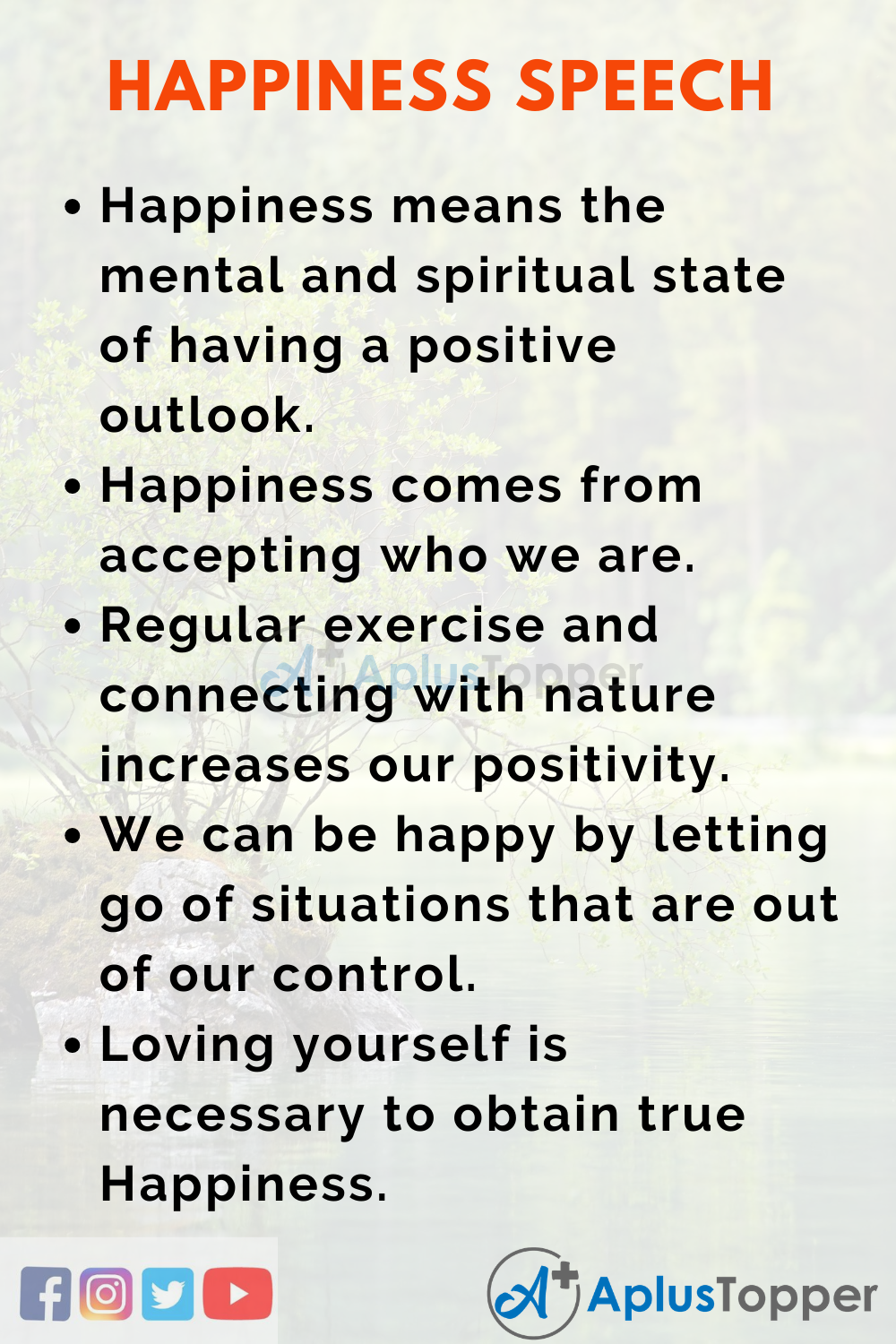
FAQ’s On Happiness Speech
Question 1. How do we feel happy?
Answer: do something you love and spend time with yourself to feel happy.
Question 2. What should I do if I am depressed?
Answer: some professionals deal with mental health issues like depressions. Get in touch with a counselor.
Question 3. How do I do something I don’t like while being happy?
Answer: There are times when you will have to do things that you don’t like. You don’t need to force yourself to like it, but don’t hold a grudge as well. Let go of your anger through some deep breathing.
Question 4. What are the things I can do to feel good about myself?
Answer: Spend time with nature and your surroundings. Go out for Morning walks to feel good about yourself.
- Picture Dictionary
- English Speech
- English Slogans
- English Letter Writing
- English Essay Writing
- English Textbook Answers
- Types of Certificates
- ICSE Solutions
- Selina ICSE Solutions
- ML Aggarwal Solutions
- HSSLive Plus One
- HSSLive Plus Two
- Kerala SSLC
- Distance Education
Talk to our experts
1800-120-456-456
- Happiness Speech

Happiness Speech for Students in English
The mental or emotional states of mind that include positive or pleasant emotions are expressed by a term called happiness. Research related to happiness has been conducted since the 1960s, in various disciplines that include social psychology, positive psychology, happiness economics, medical and clinical research. The only feeling loved by everyone. It can be achieved by enjoying the current life and accepting it as it is instead of thinking and trying to control the things which cannot be controlled. None of the feelings are under our control, whatever happens in life we have to just make a positive path and accept it. The goal in your life is to make the living worth which indirectly earns you happiness and pride. There are some values that can help us to keep happy that include friendship, love, and hobbies. The support from the people you love helps to create a positive environment.
Speech on Secret of Happiness
Happiness has different definitions, generally described as positive emotions. Most people talk about happiness, when they talk about the happiness they mean about the current situation or they might be referring to the sense of happiness in how they feel about their overall life. Happiness is a broadly defined term where social scientists and psychologists use the term “Subjective-well being” to express the emotional state. There are two key components of subjective well-being, everyone expresses both negative and positive emotions whereas experiencing positive emotions can lead to happiness. The work they are doing, relationships, achievements, and some other things in life should bring the satisfaction that provides happiness.
In happiness speech in English let us see the types of happiness:
Hedonia: It is also known as short-term happiness. Generally, it is referred to as pleasure. Leading the dream life, self-care, fulfilling the desires, sense of satisfaction, and experiencing enjoyment.
Eudaimonia: It is also known as long-term happiness. It is associated with completing the responsibilities, one should include the meaning that their life has meaning, purpose, and value. Investment in long-term goals.
Long Speech on Happiness For Students
Many people will not invest their time or they don’t feel the need to think about what happiness means, but they have an idea when they are happy. But in this modern generation, it is the most important and essential thing to know about the meaning of happiness. According to some researchers, being happy or happy is the term used to describe the state of mind that expresses positive emotions such as joy, peace of mind, well-being, and many more positive vibrations.
It is mentioned in the speech on secret of happiness about the types of happiness when you hear a joke or if you go through any funny incident then you laugh this leads to short term happiness that is for that moment or for a short period of time, instead if you keep laughing the entire day by remembering that particular joke then it is not termed as happiness. Thus most people like to have long-term happiness, it will be experienced only when the hard work done by you is paid off. Humans are often freckled-minded people, they will not have a constant mind or they will not concentrate on one particular thing, their mind changes often. People find happiness in materialistic things, these things include fancy foods, outfits, computers, some others. But it is important to know that these materialistic things provide short-term happiness.
Due to the current crisis, it is difficult to always stay happy, it is said that “An Idle Mind is the Devil's Workshop”. It is difficult to spend most of the time at home, we will get bored and frustrated easily. So instead of being silent or inactive one should always keep themselves busy by doing some work, learning something new, or should look forward to life. By following this they can be out of having negative thoughts. Living happily is a tough task. All should need an attitude to accomplish the task thus it is required to follow or including a good habit is necessary.
In the speech on happiness in life, happiness that we strive to earn is the one that cannot be earned by anybody else, it should be defined by ourselves. What other people think is right affects the personal judgments of an individual. Being in an unfavourable situation or environment for a moment affects the mood. Facing a depressive environment can make an individual ill both physically and mentally. Unhappy people always have to face problems such as anxiety, stress, depression, or insomnia. One can easily or by adding some effort can overcome physical illness, but it is very difficult to overcome from mental illness.
Happiness cannot be achieved at one go or overnight, there are no such switches that are turned on to be happy instantly. Achieving happiness completely depends on pursuing our goals. The path of happiness can include these things, regular exercise, caring for people, living in a peaceful and pleasant environment. It is often said that sharing our worries or negative thoughts with our loved ones can relieve us from stress.
Short Speech on Happiness For Students
When we speak about happiness positive emotions are the ones that come into our minds. None of the people can make us happy, we ourselves have to take care of the state of our mind. True happiness can only come when we realise the need for it. One must always be grateful to God for giving the desired things. Some people find happiness in small things that happen in their life, whereas some people find it in luxurious life, fancy foods, etc.
Doing what you love, being how you want to be provides enough happiness and confidence. Along with making ourselves happy, we can also make the people around us happy by loving them selflessly. This thought will make our surroundings or people around us happy; this indirectly boosts our happiness. Our flaws can be accepted by us as we know the reason for it, but the acceptance of those flaws by other people makes you the most loved person, this what gives real happiness to a person.
Happiness Motivational Speech:
The more we try to get happier the more it slips away from us, this directly means that happiness is not the thing that can be found in materialistic things but it is the thing that depends on one’s mental state. Here are some inspirational stories that let us see them go through them.
There was a boy and he had a very wealthy family. One day the boy’s father took him on a country trip. The main aim of the father was to show his son how poor people lead their life. They found a farm of a poor family and they spent some days on that farm. After that trip, the father enquired about the trip with the son, and the boy replied “It was great”. The father asked the son whether he had observed how the poor people had led their life, and asked him to describe deeply what he had observed. The boy replied by comparing it to the life he was leading as a boy of a wealthy family, he said that “we have a dog whereas they have four of them, we have a swimming pool to spend time and they have a big river which has no end. We have a very expensive lantern to provide light whereas they have numerous stars above them at night. We have a paved area, where they have a whole horizon. We have a limited amount of land, where they have endless fields. We buy the food, whereas they grow the food. We fence our house for the high protection but they don’t need any fencing to their houses as their friends support and help them in protection”.
By listening to the words of the boy the father was stunned and he couldn’t even speak a word. Then at the end, the boy added saying thank you to his father, he said that “ Thank you for letting me know how poor we are”. This speech on true happiness inspires us in such a way that happiness is not found in materialistic things instead it is dependent on love, friendship, and freedom.
Let us see another story,
There was a class of around sixty students, once the teacher told the kids that they are going to play a game and the teacher gave one balloon to each of the students. She then asked the students to blow it up, the students did that then she asked them to write the name of the respective student on the balloon which they have in their hands. The students did so, then the teacher asked them to throw the balloons into the empty classroom as per the teacher’s guidelines they did that. Now she asked the students to collect their own balloons which they have written their name on in a minute. They started searching for their balloons and the room was messed up but at the end of the time, none of them got the balloons in their hands and all of them were upset, then the teacher gave one more balloon to each of them and asked them to follow the same procedure and they again threw the balloons to an empty room. This time the teacher asked the students to get the balloons whichever they found and then they had to return them to the person whose name was written on them, now the students have got their balloons in a fraction of seconds, this time the students were very happy.
Now the teacher said that she conducted this just to inform the students that how important it is to help someone in their life, helping someone can make the people happy which makes the surrounding happy. This happiness is indirectly gained to each one of them.
Conclusion:
We have seen a happy speech, an inspirational story, and the reasons and causes of being happy. Thus we can conclude that being happy doesn’t only involve the happiness of a single person but it is the family or the surroundings that should be happy or pleasant. Happiness cannot be found in a single situation or it cannot be found instantly; it is to be found in one’s state of mind. Everyone deserves to be happy.

FAQs on Happiness Speech
1. How is happiness important in life?
Happiness is one of the fundamental goals in life. Everyone is constantly striving to achieve happiness through different means. Being happy can be a state of mind which expresses positive emotions like the peace of mind, joy, and various other positive vibrations. Life tends to be up and down as people experience a range of emotions in their lives however the quest is always to find happiness through the experience of positive emotions and it is one of the fundamental requirements in life.
2. What are the different factors that have an impact on happiness?
There are several factors in life that play a major role and have a big impact on the overall emotions that a person experiences. These emotions either translate to happiness or otherwise. Some of these factors include the immediate environment of the individual, social and personal care, professional achievements, well being of friends or family, and the overall social bubble of the person. If the majority of these factors are positive, a person tends to experience happiness.
3. What are the different things that can help us achieve happiness?
Some of the different factors or things that can help attain short-term or long-term happiness include love, friendship, and hobbies. Indulging in one’s hobbies is an enriching experience that brings enjoyment, satisfaction, and a feeling of positive emotions. This translates to happiness. This is why clinical psychologists often suggest people indulge in their favorite hobbies. Similarly, love and friendship are major experiences that bring positive energy and contribute massively to happiness.
4. How can I refer to the Vedantu notes “Happiness speech for students in English”?
The Vedantu notes on “Happiness speech for students in English” can be downloaded from the app or the website. These notes are offered in PDF format and can be downloaded for free. Once you navigate to the relevant page, you can find the “Download PDF” button, and when you click on it, the PDF file containing the notes will be downloaded on your device.
5. What can I expect from the Vedantu notes on “Happiness speech for students in English?
The Vedantu notes on “Happiness speech for students in English” provide a comprehensive analysis of the different aspects associated with happiness. These notes provide an in-depth summary of the different theories and factors that are associated with the eventual feeling or emotion of happiness. The notes also provide a short speech on happiness, a long speech on happiness, a motivational speech on happiness, and then provide a summary of the concept.

45,000+ students realised their study abroad dream with us. Take the first step today
Meet top uk universities from the comfort of your home, here’s your new year gift, one app for all your, study abroad needs, start your journey, track your progress, grow with the community and so much more.

Verification Code
An OTP has been sent to your registered mobile no. Please verify

Thanks for your comment !
Our team will review it before it's shown to our readers.

- Speech Writing /
2-Minute Speech on Happiness in English for Students
- Updated on
- Jun 6, 2024

Speech on Happiness: ‘Good Morning teacher and fellow students. Today, I would like to present my views on ‘happiness’. What makes you happy? Is it the quality time you spend with your family? Or any other thing? We all have different meanings of happiness. For me, happiness is not just a feeling; it’s a way of living confident, optimistic, and energetic. When we face a difficult situation, we are often worried about the consequences. This worry pushes us to work harder to achieve our goals or the desired targets.’

‘I have a question for everybody here; does money or any materialist thing make you happy? Let me tell you something; this is not happiness. We all face challenges, difficulties, and uncertainties, but overcoming them is what makes us happy. Happiness is something we create within ourselves and cultivate in our lives.’
For some people, happiness can be the simple pleasures of life, like travelling around the world, the laughter of loved ones, or the beauty of nature. For others, it may be achieving personal goals, making a positive impact on the world, or finding meaning and purpose in what we do.
The meaning of happiness is not limited to personal thoughts; there are universal truths about happiness as well. Happiness is a choice. We can’t control everything going on around us, but we do have the ability to choose how we respond to them. Even in times of distress, when nobody is hanging around, we can choose to focus on the positives, practice gratitude, and cultivate a positive mindset. Again, it’s a matter of choice. You either stay down or you stand on your ground.
Working hard to achieve your goals does make us happy, but happiness is also found in the journey leading to success. A lot of times we get caught up in worries about the future or regrets about the past, forgetting to fully experience and appreciate the beauty of the present moment.
Just like life, happiness is a journey, not a destination. Happiness is a fundamental human experience that is within reach for every one of us. Staying happy is very important because when we are happy, we radiate positivity, inspire others, and make the world a brighter place for everyone.
Quick Read: Farewell Speech for Colleague
10 Lines Speech on Happiness
Quick Read: Speech on How to Tackle Bullying in School
How to Stay Happy in Life?
Staying happy in life can be simple and enjoyable with a few easy habits. Start by smiling often, as it can lift your mood and make you feel happier. Play and have fun by engaging in games, hobbies, and activities you love. Staying active through exercise and outdoor play keeps both your body and mind healthy. Eating healthy foods like fruits and vegetables gives you the energy to feel good throughout the day. Getting enough sleep is essential to feel rested and ready for new adventures. Spending time with loved ones, such as family and friends who care about you, brings joy and a sense of belonging. Helping others, whether by assisting a friend or doing a kind deed, can make you feel good inside. Staying positive by focusing on the good things in life helps you handle challenges better. Learning new things and discovering new hobbies can be exciting and fulfilling. Lastly, practising gratitude by thinking about what you’re thankful for each day can enhance your overall happiness.
Here are some simple tips to stay happy in life:
- Surround yourself with positive people
- Manage your stress level
- Enjoy your company
- Eat healthy food and drink water
- Boost your self-esteem
- Build Resilience to cope with daily life
- Smile Often
- Stay Positive
Ans: ‘Good Morning teacher and fellow students. Today, I would like to present my views on ‘happiness’ . What makes you happy? Is it the quality time you spend with your family? Or any other thing? We all have different meanings of happiness. For me, happiness is not just a feeling; it’s a way of living confident, optimistic, and energetic. When we face a difficult situation, we are often worried about the consequences. This worry pushes us to work harder to achieve our goals or the desired targets.’
Ans: Surround yourself with positive people -Manage your stress level -Enjoy your company -Eat healthy food and drink water -Boost your self-esteem -Build Resilience to cope with daily life
Ans: Happiness is not just about money and materialistic things. -Spending quality time with loved ones makes us happy. -Overcoming life challenges makes us happy. -Happiness cannot be learned; it can only be experienced. -Helping people around us makes us happy. -Happiness can be achieved by self-realization. -Only those who are satisfied with their lives can experience true happiness.
Related Speech Topics for Students
This was all about the speech on happiness. We hope we were able to provide you with all the necessary information you were looking for. For more information on such interesting speech topics for your school, visit our speech writing page and follow Leverage Edu .
Shiva Tyagi
With an experience of over a year, I've developed a passion for writing blogs on wide range of topics. I am mostly inspired from topics related to social and environmental fields, where you come up with a positive outcome.
Leave a Reply Cancel reply
Save my name, email, and website in this browser for the next time I comment.
Contact no. *

Connect With Us
45,000+ students realised their study abroad dream with us. take the first step today..

Resend OTP in

Need help with?
Study abroad.
UK, Canada, US & More
IELTS, GRE, GMAT & More
Scholarship, Loans & Forex
Country Preference
New Zealand
Which English test are you planning to take?
Which academic test are you planning to take.
Not Sure yet
When are you planning to take the exam?
Already booked my exam slot
Within 2 Months
Want to learn about the test
Which Degree do you wish to pursue?
When do you want to start studying abroad.
January 2024
September 2024
What is your budget to study abroad?

How would you describe this article ?
Please rate this article
We would like to hear more.
Have something on your mind?

Make your study abroad dream a reality in January 2022 with
India's Biggest Virtual University Fair

Essex Direct Admission Day
Why attend .

Don't Miss Out
- Skip to main content
India’s Largest Career Transformation Portal
Happiness Speech in English for Students [Short Speech*]
August 2, 2021 by Sandeep
Speech on Happiness: Happiness is the most divine feeling of bliss and solitude in one’s heart. Every man needs to create his own happy nest irrespective of the circumstances he faces. Happiness is an underlying emotion that creates a positive frame of living. A man achieves happiness when he successfully reaches his goals. True happiness can be found only when we accept bad situations and testing times on par with cheerful times. Happiness promotes sound health and well-being.
Speech on Happiness 500 Words In English
Below we have provided a speech on Happiness, written in easy and simple words for classes 5, 6, 7, 8, 9, and 10. This speech topic help students to understand the secret of happiness in life.
A very warm morning to everyone over here. Today I am here to tell you all about ‘Happiness’.
Happiness is an emotion that defines our mental state. It is a state of mind when someone feels excited, kind, proud, or satisfied with something. True happiness comes from deep inside our hearts. It varies from person to person. For example, many of us sitting here may be happy to attend this session, but many may be disappointed.
Like that, many find happiness in earning money, good position & wealth while others find their happiness in serving, working for others. Happiness is like an art; the person who commends this art lives a satisfying life. The happy person is always positive & keeps moving forward even after hurdles in life. A happy person is always hopeful about the positive outcomes in life.
However, let me tell you about today’s scenario. Can anyone raise a hand over here who is truly happy & satisfied with life? Very few or almost no one. Today, people have such high expectations & so busy schedule of life that they are never satisfied with whatever they have or achieve in life. They do not find happiness in small things around them; when they achieve something, they keep hoping for more & more. Most of us always feel hopeless & sad about our life.
Everyone seeks happiness in life & finds out different ways to achieve it. Most of us achieve it, but that is always temporary. We all need to understand that we need to find happiness in the world around us. We need to spend time with the people or things which makes us feel good from within & gives us positivity. We need to spend time relaxing & relieving ourselves from day-to-day stress.
Searching for happiness in small things instead of always being disappointed is the key to a peaceful life. Spending time with family, talking to friends, having small get to gather with near & dear ones, celebrating festivals together with neighbours & many more, introspecting yourself to know what real happiness is essential.
We all need to learn the art of happiness, which does not depend on external factors. Live, enjoy each & every moment of your life. Start accepting the changes around you, as changes are the only constant in this life. I would like to end my speech with a very famous quote from Aristotle.
“Happiness depends upon ourselves.”

1 Minute Speech on Happiness In English
Good morning to one and all present here. Today, I’ll be giving a short speech on the topic ‘Happiness’.
They say, “All work and no play makes Jack a dull boy.” Thus, it is important to set aside whatever work we may have once in a while and indulge in activities that would cheer us up and make us feel light and happy.
Scientifically too, it is proven that the serotonin secretion induce by being happy in the body helps in maintaining its overall health. So live, laugh, and be happy!
Related Posts:
The science of happiness (w/ Laurie Santos) (Transcript)
Listen along.
How to Be a Better Human The science of happiness (w/ Laurie Santos) January 23, 2023
[00:00:00] Chris Duffy: You are listening to How to Be a Better Human. I am your host, Chris Duffy. Here's a strange thing that I have noticed about my own brain. Often, the times that I feel the happiest are where I have a lot of irons in the fire. There's all these possibilities, and there's this sense that exciting things might happen.
But the thing that's weird is that I often feel happier in that moment where the irons are in the fire than when they actually come out and become a real thing, right? Like even if I have accomplished something that feels really big and special, like we finished recording a season of this show, or I did a big live show and it went well, I crash so hard that night or the next day as soon as I've done the thing that I thought that I really wanted to do, it's like I have a happiness hangover. I'm confused, to be honest, about why it is that accomplishing the things that I thought I wanted to accomplish often don't make me feel very happy at all.
In my experience, happiness is kind of a slippery fish. When I try my hardest to grab a hold of happiness, it just flops outta my fingers and slides away. But, when I ignore the fish and I focus on other things, sometimes outta the corner of my eye, I see that, hey, that happiness fish is swimming right around next to me all over again.
Our guest today is Laurie Santos. Laurie started The Happiness Lab podcast to help people understand how science could help them lead more satisfying lives. And I promise you, I swear Laurie is going to use zero fish-based metaphors to do that. Laurie's podcast grew out of her work teaching at Yale, where she started a course called Psychology and the Good Life. It's also known as the Happiness Course. Since then, Laurie has taken the happiness course online at Coursera, where thousands of people enrolled in the program. But then when the pandemic and the lockdowns came, a time when so many people were reassessing what was truly important in their lives, that number shot up into the millions.
But a part of Laurie's interest in exploring human happiness didn't actually come from working with people at all. It came from working with animals. Laurie gave a TED talk explaining her research with monkeys. I love this clip.
[00:02:00] Laurie Santos: And because we started this work around the time of the financial collapse, around the time when foreclosures were hitting the news, we said, “Hmm, maybe we should actually start in the financial domain. Maybe we should look at monkey's economic decisions and try to see if they see, do the same kinds of dumb things that we do.”
Of course, that's when we hit a sort of second problem, a little bit more methodological, which is that maybe you guys don't know, but monkeys don't actually use money. You know, you haven't met them. This is why, you know, they're not in the queue behind you at the grocery store, at the ATM. You know, they don't do this stuff. So now we faced, you know, a little bit of a problem here. How are we gonna actually ask monkeys about money if they don't actually use it? So he said, well, maybe we should just actually just suck it up and teach monkeys how to use money. And so that's just what we did.
[00:02:42] Chris Duffy: When we return, we will find out more about what Laurie learned from animals about our most deeply embedded attitudes towards happiness and what we can each do to be happier in our own lives.
[00:03:01] Chris Duffy: Okay, we are back. We're talking about what it means to be happy with Laurie Santos.
[00:03:07] Laurie Santos: Hey, I'm Laurie Santos. I'm a professor of psychology at Yale University and host of The Happiness Lab podcast.
[00:03:13] Chris Duffy: So, Laurie, I, I first heard about your research that was basically like having monkeys build a, an economy based on different types of fruit.
[00:03:20] Laurie Santos: Yeah, I mean, it was pretty good description actually. Um, so we wanted to see, one, whether or not some of the standard economic biases that humans chose were shared with monkeys too. And so we taught monkeys how to use a kind of form of currency, these little metal tokens that they traded with humans for food.
And that mean, meant that we could put monkeys into kind of really simple economic experiments. Really asked them their preferences about things like risk and, like, whether or not they paid attention to how much food they were getting and so on.
And what we found was the monkeys were pretty rational in all the spots that humans were rational. But they also showed all the same irrational biases that humans tended to show. They were, they overpaid attention to risk, and they kind of were, had this tendency to frame what they were getting in terms of gains and losses, which is the kind of thing that leads humans astray.
[00:04:04] Chris Duffy: And one of the big things from the study that has just kind of always stuck in my head is that there were a lot of monkeys who were totally happy with the fruit that they were getting until they saw that a different monkey was getting more fruit or better fruit. And then all of a sudden they became furious and didn't like the things that had made them happy just moments before.
[00:04:21] Laurie Santos: Yeah. I mean, this, this was actually some lovely work by Sarah Brosnan who used really similar kinds of studies with, with her group of monkeys, and it’s, an, yet another bias that we tend to show, right? Which is that, that we tend to socially compare ourselves with others. So even if what we're getting is perfectly fine, as, as soon as we see that somebody else is getting something that's better than we are getting, all of a sudden we're unhappy with it, and, and this has a really strong connection to happiness and, and subjective wellbeing, right?
Because we’re, like, doing well in terms of got a roof over our head, you know, food on the table and so on. But we're so prone to be seeing what's going on with other people, and it can really negatively affect our happiness, even when in cases when we're objectively doing really well.
[00:04:59] Chris Duffy: Is that part of the bridge of what got you into human happiness? I, I wonder if, if seeing how animals, how it's kind of hardwired into many of us to, to have these things that make us unhappy, that we wish we could overcome, was, was part of the seed of what brought you into happiness in the first place?
[00:05:15] Laurie Santos: Yeah, I think so. I mean, I think one of the reasons I was always so fascinated with work in monkeys is because a lot of times we, we get focused on “Oh, humans, we do things so amazingly well. We have all this technology and language and this amazing culture. We're so different than other animals.” But when I look to humans, what, what I saw generally was, yeah, you know, we're, we're doing great. You know, we're having this podcast, no other animal, no bonobo is doing that right now. Right?
But we're also so prone to error. We're so prone to bias. We're so prone to not appreciating what we have. You know, the take that I, I bring to my students and, and that I talk about a lot on my podcast is this idea that our minds lie to us when it comes to happiness, right? We have these intuitions about the sorts of things that would make us happy, but in practice, a lot of those intuitions the research shows are wrong.
And so I think the connection with the monkey work is recognizing how deep some of these errors go and that we might have errors when it comes to happiness as well.
[00:06:07] Chris Duffy: You teach at a school where there are so many driven students, right? There are students who are high achievers who have gotten into one of the most prestigious universities in the world. So you, in some ways, you would think like, you've done it, you should be happy. But I, I know from listening to other interviews that you've done that one of the things that you really found was that your students were really unhappy, kind of profoundly so.
[00:06:29] Laurie Santos: Yeah, and I saw this, you know, in a really acute way in this new role that I took on on campus. So I've been teaching at Yale for now about 20 years, which makes me feel very old. So I saw students in the classroom and in my lab, but I didn't really get to know them really well. All that changed when I took on a new role at Yale where I became a Head of College on campus. So this is a role where I, I li—physically live with students.
Like, my house is in a quad with students. I eat with them in the dining hall and so on. And that was where I got to see this college student mental health crisis up close and personally. You know, particularly acute at Yale because as you've said, Yale students, these Ivy League kids that are incredibly driven and so on.
But I think a shocking thing that I realized is that it's not just at Yale. In fact, there's lots of evidence that just nationally, students are really struggling. So nationally right now, college students report being too depressed to function; they're lonely. They're overwhelmingly anxious. And nationally, right now, more than 1 in 10 students has seriously considered suicide in the last year, right?
This is not just a couple snowflakes in the parlance of, you know, I think what the media talks about, right? This is a real national health crisis. I realized, you know, I really wanna do something about this. Also as educators, I think we’re not really fulfilling our educational mission until we address this, right? Like students too depressed to function most days. Like they're not learning whatever we're teaching them if we're teaching them, I don't know, Shakespeare or computer science, like they're not like retaining this, just memory-wise. They, their brains can't possibly pick up on this information if they're feeling so depressed and anxious.
And so, that was kind of, more the origin story was to realize: we gotta do something about this. You know, I think my field of psychology has a lot of answers for the kinds of things you can do to feel better, right? Things you can do to not feel so stressed and depressed and anxious. And so I said, well, let me develop a whole class where I teach students all these strategies. Let me kind of give them, you know, the party line of what my field says about things you can do to feel better and hope that they can put these things into practice themselves.
[00:08:14] Chris Duffy: Well, when we're talking about college students feeling too depressed to function, when we're talking about 1 in 10 students in the classroom thinking about suicide, having self-harm thoughts, how do you walk the line between the science of happiness and trying to get that out to people and not making people feel bad that they're not already happy?
Which I, to be clear, I don't think you do, but I think a lot of the, like, “You should just be happy” framework that's out in the, the world sometimes does that, is like this toxic positivity side. So, how do you personally think about, like, walking that line?
[00:08:47] Laurie Santos: Yeah, no. Toxic positivity is real and I think it, it honestly, I think it stems from yet another myth that we have about happiness, right? Which is that a good life means being happy all the time, right? If I'm feeling sad or frustrated or angry or anxious or whatever, I've done something wrong, right? And I need to fix it. And I think this is a myth, right? Emotions are these signals that are telling our body what we should be doing in the future and how we should behave in the future.
And negative emotions are an incredibly important signal, right? Your sadness is telling you that there's something amiss. Your loneliness is telling you that you might need to seek out social connection. Your anger is telling you that something is wrong, that there's an injustice out there that you need to fix. And so I think this idea that, you know, we need to be happy all the time would just be psychologically and, and evolutionarily would be terrible for us, right? Like we'd be missing out on these signals that tell us what we need. And so I think what we, what we need to do, and what I preach a lot in the class isn't, happiness isn't about being happy all the time. It's kind of having the normative emotions that come up based on situations.
[00:09:48] Chris Duffy: This is one of the things that I admire most about your work, and I think it's so interesting is that you really are rigorously grounded in the science and in the practical pieces that make a difference. I mean, one thing that really stands out to me is that when your course was offered as a free online class, they were able to measure significant increases in well-being scores. So this isn't just like, “Hey, look at the sun and say ‘I'm happy,’” and then all of a sudden you feel happy. This is like real practice.
[00:10:15] Laurie Santos: I, I'm a scientist first and foremost, and you know, I wanna help people, but I also wanna make sure that we're not selling snake oil, and as you've said, there's a lot of snake oil out there, right? From the toxic positivity to the woo stuff, right? There's just a lot of advice out there that these isn't necessarily scientifically rigorous, although it pretends that it is, or at least it's kind of scientifically adjacent. If I say, “Hey, experience more gratitude”, or “Look at the sun”, or whatever the recommendation is, I'm saying, “And here's the paper that shows that it might work for you”, and if possible, trying to test it ourselves to make sure, you know, hey, if we suggest these strategies to students, if the students actually put these things into practice, will we move the needle? And I think that's a hard test, right? I mean, there’s… behavior change is really hard, and I think there's a lot of factors that affect our happiness. So if a simple 10-minute practice that I'm suggesting to students is moving the needle, realistically, it's probably not gonna move the needle that much.
Like if all of a sudden, my students go from zero on a happiness scale to a hundred, probably something's wrong. But the cool thing is that we actually do see small but significant increases in happiness. Small but consistent increases in people's self-reported happiness, and, and that's really cool. It suggests that some of the practices that we're suggesting really can work.
[00:11:24] Chris Duffy: So let's, let's talk about it then. What are, what are some of these practices that you would recommend?
[00:11:29] Laurie Santos: You know, if you survey people you know, or again, around the new year, like when we’re having this conversation, there’s a lot of goals out there that people think are gonna make them happy. You know, right now, or at least if you look at statistically last year, in 2022, people's top New Year's Resolutions were lose weight. Like, you know, around 4 out of 10 people basically said they wanna lose weight. Absolutely no evidence that losing weight is gonna make you happier. Changing your body in general, probably not gonna make you happier. What really does make us happier though, is changing other behaviors. For example, increasing our social connection? A huge, huge boost in people's happiness.
Pretty much every available study of happy people suggests that happy people are more social. And there's also evidence that getting more social will increase your happiness no matter your personality profile. So even if you are a self-reported introvert, getting some social connection will make you feel better.
Again, not like huge parties, huge crowds, but just like contacting that person one-on-one that you care about, but you haven't been in touch with in a while. Another big boost for our happiness is kind of getting away from this idea of self-care. These days we hear a lot about treating ourselves, and I think sometimes self-care can be like, you know, “buy this bubble bath”, but sometimes it's really about, you know, me time, and me, me, me.
But if you look at happy people, they're not as self-focused. They tend to be really other-oriented. Happy people on average, controlled for income, donate more money to charity. Happy people on average, controlled for free time, spend more of their time volunteering. They're kind of, just like, doing stuff to make other people happy rather than focused on their own happiness.
And so there's evidence that if you just kind of do more stuff for other people, get kind of out of your own headspace and try to help others, it can actually boost your happiness. So those are just some behaviors that help with happiness. There are also lots of mindsets that we can shift into that can really help with our happiness.
For example, a mindset of gratitude. This idea of just counting your blessings, like taking moments to notice the good things in life sounds super cheesy. You know, sounds like grandmotherly wisdom, but I always say: “It might be common wisdom, but it's not common practice.” Like, common practice these days is to complain about everything, right?
But again, there's evidence even if you just like write down a few things that you're grateful for every night, we can show significant increases in your happiness in as little as two weeks. A final practice I'll, I'll mention is sort of this mindset of being a little bit more present, right? You know, we talk, people have heard about mindfulness and being in the present moment, but, but the evidence really suggests that like, if you're just there with whatever's going on, noticing it, paying attention to it, and allowing it, that's better.
And that includes being present when things, like, suck. Like that includes being present when you're feeling frustrated, when you're feeling really sad, when you're feeling overwhelmed. The, the start of the new year where you're like, “Ah, there's always things I didn't finish last year. There's so much on my plate.” Like that's a moment to say, “Hey, wait, let me notice for a second. That's, that's overwhelm, right? That's, that's feeling like I haven't had a break.” And that's not a nice thing to notice and feel. It's much better, you know, to pretend that that's not happening or cover it up or check your email or whatever.
But the act of noticing that, it turns out, is important. It ultimately winds up making us feel happier, in part ‘cause it causes us, when you notice it, you gotta deal with it and allow it and change it perhaps in some cases. So, this act of being present is important, but it's not just being present when everything's like unicorns and rainbows. It's also being present when things don't feel so good.
[00:14:40] Chris Duffy: It's interesting ‘cause that, that does seem to tie back to what you were saying before about the toxic positivity pieces, right? Like if, if you insist on everything has to be happy and good all the time, you can't actually be present when you're not feeling happy and good, and that paradoxically leads you to feel less happy and good.
[00:14:57] Laurie Santos: It prevents us from really taking action on the things that matter, right? No, really noticing like, “Oh, this is loneliness”, and “Oh, hey, I can do something about loneliness. I can reach out to somebody. I can do something different.” Or “I'm feeling really overwhelmed”, like, actually that means you need some rest. You need to need to take some things off your plate.
And so, I think we can’t, like, see the solution that's gonna help us most unless we know what the problem we're dealing with is and, and knowing that problem requires understanding what emotion we're experiencing at any given time.
[00:15:23] Chris Duffy: Something that I often think of as kind of my personal goal for happiness is if I imagine myself in this metaphor as I'm a cup, to, to be overflowing with so much that I can fill other people's cups. Sometimes I associate the idea of, like, volunteering and charity with like, oh, there's, I'm overflowing so there's plenty to give, and that's when that happens. But it sounds like you're actually saying that that can also help fill my own cup, which I know I'm pushing this metaphor to its very limit here, but I wonder if that, is that true?
[00:15:53] Laurie Santos: I think that's totally right. I mean, I think another misconception that comes up when we think about happiness and motivation and things is this idea that if I do something nice for others, it kind of, like, depletes me, right?
There's this kind of fixed happiness pie out there, right? And if I kind of give some of the happiness to someone else, I'm kind of losing out myself. But that's just simply not what the data suggests. Ha, like the nice stuff in the world and happiness isn't a zero-sum game. Like, we're actually increasing the pie.
So you're kind of, to use your cup metaphor, I guess, making the cup even bigger. like you kind of add parts to the cup, you know, larger and larger cup, which again totally, I mean, it's absolutely not what our intuition is. It's not what my intuition is. I mean, I know the data. I can cite the studies on this stuff showing people, again, people who do nice things for others tend to be happier. If I force you to do nice things for other people, rather than do nice things for yourself, that will over time make you happier. Just like the simple act of forcing people to give some money to charity makes them feel better. Right?
But that's not my intuition myself, especially when I'm having a bad day. My instinct is not, “Hey, let me do something nice for my brother”, or “Let me, like, give a gift to a coworker,” or something. It's, it's me, me, me. It's like, “I want this stuff.” But in fact, I know from the data that if you really do something nice for somebody else, you'll wind up feeling better. So yeah, we're increasing the cup size as we go.
[00:17:10] Chris Duffy: Okay. Well take a second to grab your increasingly enormous cup and get yourself a refill of whatever it is that you're drinking, because we're gonna take a quick break for some ads, but we will be right back with more from Laurie in just a moment.
[00:17:33] Chris Duffy: On today's show, we're talking to Laurie Santos about science and well-being, and here is a clip from Laurie's podcast, which is called The Happiness Lab.
[00:17:40] Laurie Santos: Science shows us lots of really simple habits we can add to our lives to feel better. We can take more time to connect with the people we care about, or just chat with a stranger we meet on our commute. We can try to reduce the exhausting choices we make on a daily basis. We can count our blessings. We can become more accepting, both of the bad emotions we feel and the obstacles we face in life. We can stop focusing on the end goal and think more about the journey.
[00:18:06] Chris Duffy: How much of happiness or, more broadly, well-being is adding positives? And how much is removing negatives?
[00:18:15] Laurie Santos: Oh, I think it's, I mean, it's definitely a little bit of both, right? I think things like adding social connection, you could construe as adding some positives in, right? I'm, I'm getting the boost of the social connection, but it's also decreasing your alone time, right? It's also getting rid of loneliness to a certain extent.
I think, also, a lot of, another big factor for happiness that we haven't talked about yet is giving yourself a little bit more free time. There's lots of evidence for the power of what's called time affluence, this subjective sense that you have some free time. And for most of us, kind of feeling more time affluent means taking some stuff off our plate, right?
Like taking stuff out of the calendar rather than adding to it. And so I think we, we sometimes often forget that, like, happiness requires taking stuff away. But definitely, when it comes to boosting our time affluence, there's a lot of spots where we need to take some stuff away to get more bandwidth to even think.
[00:19:05] Chris Duffy: It’s interesting. I feel like for myself, one of the things that is often a, a trap for me to, to feel less happy is being too focused on, on money or income. Especially because I have irregular income, so it causes a lot of stress as to be like, well, “Is this actually gonna last? How long is it gonna last for?” Blah, blah, blah.
But sometimes then when I look at my actual day, and I think like, “What would I do if I won the lottery?” I don't think I would actually, like, fly to some exotic locale. I'd probably, like, see some friends and have a great conversation with someone, and I want to make a lot more money so that I can do exactly what I'm doing now, but not worry while I'm doing that right now, is a strange loop that breaks me out of that cycle a little bit sometimes.
[00:19:43] Laurie Santos: Yeah, and I think this is, you know this, this is some lovely work by the Harvard Business School professor Ashley Whillans, that shows exactly this, that often when we think about getting more time, we're often thinking about, “Well, I'd have to give up money to do that.” But what she finds is that people who focus on being wealthy in money aren't as happy as people who focus on being wealthy in time, and in fact, even spending your money to get back more time.
You know, if you have, if you are lucky enough to have some discretionary income, spending it to, you know, not have to clean your house, or even in some cases, like, buying takeout so you save time cooking and things like that. Spending your money that way and really framing it that way, which is, which is a, a spot where we mess up. A lot of us might go to a restaurant, but we don't sit in the restaurant and think, “Look at how much time I'm saving. I don't have to go to a grocery store. I don't have to clean the dishes.” We're not framing it in terms of the time saved, but the act of doing that can make you happier, much happier than, than money can make you on.
On the money and happiness points, it’s worth saying money does make you happy if you don't have much of it.
[00:20:40] Chris Duffy: Yeah.
[00:20:40] Laurie Santos: Right? Like if you can't put food on the table, if you can't put a roof over your head like it, it really will make you much happier to get some money. So it's not that money doesn't matter for happiness, it's that for probably a lot of the people listening to this podcast, if you have the basics in life, getting more money isn't really gonna help. And in the US right now, that's at around 75k, some estimates put it at. This is work by Danny Kahneman and Angus Deaton. Find around 75k. That's probably the upper limit of like, if you were to double or triple your income, would it matter very much?
So if you’re, like, lower than that, more money will make you happy. Probably not as happy as you think, but a little more might help after that point. More is just, it's just kind of gravy. It's not really gonna help as much as you assume. [00:21:21] Chris Duffy: When you, you're in a situation, obviously, where the basics are hard to come by, so much of life is, is, requires a lot of mental energy. It also requires a lot of, there's a lot of instability where you're not really sure. Things aren't predictable. Are we actually happier when we know, like, this is just reliable? Like, I know for sure my rent is covered. I know for sure I, I'm gonna be able to go to the grocery store. Like, those are kinds of predictability that I, just intuitively, they seem like they must be really important for happiness.
[00:21:48] Laurie Santos: It honestly kind of depends. I think if there's a really important thing like food on the table that you're not sure you're going to get, that feeling, that anxiety is real, like that anxiety's a true signal of like, “Man, if we don't do something different, we might get, not get food on the table.” So it's that those negative emotions are honest signals that are telling you, “Hey, a really important thing kind of matters.” You know, we sometimes forget that back in the day, this, you know, Maslow had this idea of Hierarchy of Needs, and at the bottom, it’s like food, shelter, you know, whatever.
Sometimes in our discussion of happiness, we can forget, like, no, no, no. Those basics are still basic. Like those are still really essential. If you're unsure of them, it's gonna be a bad scene. But once we get them, then there's a question of like, okay, what else, kind of, has to be stable in life? What else has to be uncertain? And I think, you know, obviously, novelty is kind of interesting, but that's in part because we get used to the things we have, right?
And so one way to, to get back the novelty is to find ways to reframe the stuff you have as kind of being interesting again. It’s sort of getting off what's often known as the hedonic treadmill, which is this idea that if you're on a treadmill for a long time, if you're running, you can sort of get used to it. You get used to the pace, you know, such that when you get off it, you're like, whoa. The, you know, like, feels like the world's not moving anymore. Right?
This is a, a treadmill that we can get on with all our, the rewards that we experience in life, all the good things in life. It's one of the reasons that gratitude can be so powerful is that gratitude can get you to notice the stuff that you already have. And so, yeah, it's true that it feels like novelty will help us feel better. You know, a new phone, you know, a new trip or a new whatever. But often it's because we, we have stopped experiencing the benefits of the things we already have. So if we can use strategies to re-experience the benefits of the stuff we have already, then we don't have to buy anything, then we don't have to make any changes. We just kind of get the same happiness benefit over time for the stuff that we, we have now.
[00:23:34] Chris Duffy: So this, this is coming out in the new year, and I wonder, what does the scientific research around wellbeing and happiness say about New Year's resolutions and about the way that we actually should approach a new year? Which, obviously, I feel like every scientist I know is, feels very strongly that, like, January 1st is just a day. It’s truly just one more day. But for a lot of people, it doesn't feel like that.
[00:23:57] Laurie Santos: There's some evidence that it's worth sort of striking when the iron is hot, when the sort of motivation iron is hot and there is evidence for, for what researchers call the fresh start effect. This is some lovely work by, uh, Katy Milkman, the University of Pennsylvania, and what, what she finds is our motivation, like, can kind of kick into high gear at certain temporal moments, right? New Year's is obviously one of them, but we have other ones. Like our birthday is often a time where we're like, this year, you know, a new switch, right? They’re these kind of moments that should be arbitrary, right?
January 1st is just another day, but for some reason, it feels like we're turning a new page where, like, new page on the calendar, blank slate. Like, anything is possible. And she finds it, like, those things matter, right? They can actually be moments where, because our motivation is in high gear, it makes sense that we're ready to make some changes.
I think the problem though, with this fresh start effect is that we apply it to the wrong changes. We're like, “This is the year that I'm gonna lose a bunch of weight. This is the year that I'm gonna make more money at work or really double down on my career.” Right? When, if you took the fresh start moment and said, you know, “This is the year that I'm really gonna invest in social connection. This is the year that I'm really gonna try to talk to myself in a different way so I'm a little bit more self-compassionate. This is the year where I'm really gonna focus on the things I'm grateful for and just try not to pay as much attention to the negativity and the hassles.” Then the fresh start effect, you'd kind of apply this moment where motivation was feeling so amped up, you'd kind of apply that motivation in positive ways that would really have a true effect on our happiness.
So, I think it's not so much that New Year's resolutions are bad. I think, yeah, any, any day you're feeling motivated to go for it, you know you should go for it and make changes. The problem is that we pick the wrong changes. And I think we also go about those changes with the wrong attitude. Um, we sometimes talk to ourselves, especially I think in the new year in this sort of drill instructor mindset, where it's like, “Well, if I just scream at myself and berate myself for how crappy things were last year, I'll make it all better this year.”
And there's so much evidence to suggest that that simply doesn't work. That we, we'd do better if we took baby steps, if we engaged with these goals with a little bit more self-compassion, like kind of thinking about, not in terms of perfection, but in terms of kind of getting better slowly over time. So we, we need to pick different resolutions and we need to go about them a little bit differently.
[00:26:06] Chris Duffy: I’ve heard you talk before about, uh, this term “mind hitches.” Can you tell us about what that is?
[00:26:10] Laurie Santos: Yeah. I mean, this is the idea that like, you know, our mind kind of sometimes messes us up, right? I think, I think the problem with happiness isn't that we're not working towards it. I think most of us are putting in a lot of effort to feel better, but the problem is that we seem to be doing it wrong. Like we, we tend to go about the wrong goals. And so I think understanding these biases, these spots where our minds go astray, can actually be really helpful. It's worth noting that they don’t fix things completely. Like I still have pretty much all the wrong intuitions when it comes to happiness about like my social connection and what I need and what circumstances will make me happy. I have the same bad intuitions as everybody else, but I think if you know that your mind is leading you astray, you can start doing better.
[00:26:49] Chris Duffy: You say you're, you're not so good at this yourself.
[00:26:51] Laurie Santos: Oh, I suck terribly, terribly.
[00:26:52] Chris Duffy : What are the things that you struggle with? Like when you personally see it, like you're like, ah, “I'm not doing my own research”?
[00:26:57] Laurie Santos: I mean, literally, I mean like having a tough afternoon, right? Today I have a bunch of podcast interviews, a bunch of meetings. I know around five o’clock, it's gonna be one of those days where I'm feeling tired, and my instinct is gonna be like, “I'm gonna plop down and watch the next new Netflix show and like, not get up, not talk to anyone.” Probably, you know, eat a bunch of junk food.
Like that's what my brain is like: “Do this, and everything will feel better.” And I know that actually if I, like, called a friend or if I did a hard Pilates workout or if I just took a walk and/or meditated, all of those things would feel way better than plopping down and watching Netflix and eating a bunch of junk food, but like it's hard to remember that in the moment. It's hard to really do it.
[00:27:37] Chris Duffy: So I believe you, and I also believe the science and the research is correct about these things, but I do feel at least inside of myself, this like instinctive desire to push back when you say like, “I've had a long day, instead of watching my favorite Netflix show, I should do a hard Pilates workout.” What are the things that people push back on the most? ‘Cause I feel like that might be one of them.
[00:27:58] Laurie Santos: Yeah. To be fair, it, it depends on what you need, right? You have to figure out what's gonna work for you in those moments and, and pay attention really to, like, kind of how it's feeling. In terms of some of the stuff where people push back a lot.
You know, especially with my, you know, Type A Yale students, I get a lot of pushback when it comes to the work on money. A lot of them have worked incredibly hard in high school to get into a place like Yale so they can leave and get, you know, a job in finance or where they're gonna make a lot of money and I'm telling them like, “Nope, that's not gonna work.”
After I present the work saying after 75k, you're not gonna feel better, they’re like, “Well, what if I invested different? Or what if I…?” Like really? They really don't like that. Um, get a lot of pushback when it comes to this idea of, of negative emotions, right? That, that like we should allow and be one with our sadness, with our anxiety.
I think that can feel really scary. How can I even overcome these emotions? So that's a spot where I get, you know, lots of pushback. And then also just this idea of is this the right enterprise? I mean, I think in the midst of where we've been with the COVID-19 crisis, with anti-black violence, with political polarization, with the climate being on fire, it can feel weird to focus on our happiness.
I think people are like, “Is that just, like, really selfish or kind of Pollyanna-ish? Right? Like, I'm just gonna pretend that I'm happy when the whole world is messed up.” And I think that's a spot where there are, are really interesting empirical data to push back. Because what the data suggests is if you really want to fight for social justice, if you wanna take action against climate change, you might actually wanna focus on your happiness, because if you look at who's doing the push for these kinds of things, it tends to be people who are happier.
You gotta put your own oxygen mask on first before helping others or helping the world. But we forget that our mental health kind of matters for our ability to do good stuff in the world and also for our performance. So that's another spot where I get pushback is like, does this stuff really matter beyond just kind of selfishly feeling good? And it's like, yeah, I actually think we'll solve a lot more of the crises in the world if a lot of us were feeling better.
[00:29:54] Chris Duffy: You don't have to wait till you're perfectly happy because giving your life meaning by working towards stuff will actually make you happier in the long run. It sometimes doesn’t. I think we sometimes forget that too.
[00:30:04] Laurie Santos: Totally. I think the key is, again, how much we're pushing and how we're doing and not noticing, and this is something that you can speak to from my own experience, you know, so I'm actually taking a year off this year to kind of address my own sense of burnout. I was in the trenches working with students in the midst of COVID-19, fighting for all this stuff, and was starting to notice all the classic signs of burnout, things like that you’re just really exhausted all the time and even getting a great night's sleep doesn't make you feel less exhausted. Things like cynicism where you know, like simple questions that my students had really, like, irk me a little bit more than they should have and a little bit more than they would have if I was feeling a little bit better.
Focusing on happiness, helping my students, it’s given me tremendous purpose and meaning in life. But that doesn't mean you can pull back and stop paying attention to when the balance is a little bit off, and if you find that it's a little off, that is definitely a negative emotional signal that you should pay attention to, ‘cause there's lots of evidence that if you don’t, then you're in for a full-blown burnout. And, and that doesn't, that doesn't go very well after that.
[00:31:03] Chris Duffy: One topic that I, I would like to get a little deeper into is how COVID-19 and the pandemic and the shifts that have happened in the world over the last couple years, how those have changed the way that you think about happiness and well-being.
[00:31:18] Laurie Santos: You know, if anything, they've made me realize how important they are and, and how fragile some of the things that we need for our happiness really are. I mean, if you designed a disease that would hit at some of the things we fundamentally need for happiness, like COVID-19 would be it, right? Like it really made it so difficult to engage in social connection, right? It was like this uncertain thing that's still kind of uncertain. Is it here? Is it not here? How long is it going? Right?
These are all things that the human mind doesn't deal with well, and we, we faced it, and out of nowhere, like in the middle of, you know, a time when we were also experiencing political polarization, which makes us feel uncertain and, and allows us to feel a lack of social connection. We experienced it at a time of climate anxiety, which is a normative anxiety to have. It should be scary that the planet is getting hotter and hotter, right? It means all the more that we need to start focusing on our mental health, in part because there's things chipping away at it, right? So we need strategies to kind of do better, but also, as I said, like these are threats that are real, that I hope someone, especially my young, smart students, will be able to solve. And unless they're protecting their mental health, they simply won't have the emotional bandwidth to fix any of this stuff either.
[00:32:26] Chris Duffy: If someone's listening to this and they immediately, like this podcast ends, they start a practice right now, like what's something that they should do in this moment as soon as the show ends to make themselves a tiny bit happier?
[00:32:38] Laurie Santos: Yeah. Well, I think the social connection piece is powerful. I think if when this podcast ends, you pick up your phone, and you try to text a friend or call a friend or set up a time to like, engage with another real human being in real life, it’s a positive thing you can do, and I promise that once you actually engage in that, at the end, if you, again, play scientist yourself and take your own data and figure out like, how am I feeling? You'll feel, “Oh, I feel much better.”
I bet you you'll feel relatively better, relative to maybe what you could have done with that half hour, which is like scrolling, scrolling through your social media feed or something like that. That would be the biggest, fastest takeaway. But I think all of these practices we've talked, it’s worth noting that, like, they're kind of fast, right? Figuring out time to text a friend, you know, I’d best that I'll take half hour. Doing something nice for someone, texting someone and checking in about how they're doing, or doing a quick $5 donation to charity. If you're having a bad day, doing something to feel a little bit more present.
You know, that could be, like, a five-minute meditation or just like, three conscious breaths of where you are right now in terms of your emotions. Scribbling in a gratitude journal. That’ll take you like five minutes, right? I mean, all the things we're talking about don't have to be these mega investments.
And I think recognizing that, realizing that these tiny baby steps can have big effects is also a way forward to realize you don't have to revamp the whole wheel, like your fresh start doesn't have to be a, like, tearing off the new page and like throwing out the rest of the book. You can really just be these small changes that you do intentionally and ideally turn into a habit over time that can have a big impact on how you're feeling.
[00:34:07] Chris Duffy: Well, Laurie Santos, thank you so much for being here. It's been a pleasure to talk to you. I'm sure that anyone who's listening to this podcast is going to immediately go and listen to The Happiness Lab, your podcast, to get even more from you. But really, it's been an absolute pleasure. Thanks for making the time.
[00:34:21] Laurie Santos: Thanks so much for having me on the show.
[00:34:25] Chris Duffy: That is it for today's episode of How to Be a Better Human. Make yourself happier by immediately texting a friend or loved one about the show, and have them listen to this episode so that you two can discuss it. A huge thank you to our guest, Laurie Santos. Her podcast is called The Happiness Lab. I'm your host, Chris Duffy, and you can find more from me, including my weekly newsletter and information about my live touring dates at chrisduffycomedy.com.
How to Be a Better Human is brought to you on the TED Side by Anna Phelan, Whitney Pennington-Rodgers, and Jimmy Gutierrez, who are psyching themselves up right now to come home from work and do an intense Pilates workout. Every episode of our show is professionally fact-checked, so you don't have to just take my word for what you're hearing. Thank goodness. This episode was fact-checked by Julia Dickerson and Erica Yuen, who much to my amazement, tell me that scientists really did teach monkeys how to use a fruit-based currency.
From PRX, our show is brought to you by Morgan Flannery, Rosalind Tordesillas, Jocelyn Gonzalez, and Patrick Grant, who are taking the next five minutes to furiously scribble in their gratitude journals.
And of course, thanks to you for listening to our show and making this all possible. We will be back next week with even more How to Be a Better Human. Until then, take care and thanks so much for listening.
Psychology of Happiness: A Summary of the Theory & Research

Little did I know the overwhelming depth of this topic! I found myself asking questions – can science explain happiness?
Can happiness be measured? What is happiness, anyway?
Arguably, a lot has been written on the topic of happiness , including on this website. The following provides an exploration of happiness, and, importantly, it provides you with links to further resources on this important topic.
Keep reading to discover a range of topics including the main theories of happiness, and a fascinating look at the neuroscience of happiness, as well as an interesting discussion on topics such as subjective wellbeing (the more scientific term for happiness), what positive psychology has to say about happiness, success and happiness, and more. Hopefully, it will answer some questions about happiness. Please enjoy!
Before you continue, we thought you might like to download our three Happiness & Subjective Wellbeing Exercises for free . These detailed, science-based exercises will help you or your clients identify sources of authentic happiness and strategies to boost wellbeing.
This Article Contains:
A scientific explanation of happiness, a look at the theory and science of happiness, the psychology of happiness, happiness and positive psychology, interesting research and studies, the happiness research institute, the happiness professor, other well-known researchers, articles on success and happiness, 16 most important happiness articles, other recommended journal and scholarly articles (pdf), a take-home message.
What exactly do we mean when we talk about a scientific explanation of happiness? What, in fact, is the science of happiness?
Put very simply, the science of happiness looks at “ what makes happy people happy ” (Pursuit of Happiness, 2018). If you think about it, the subjective nature of happiness makes it incredibly difficult to define and also challenging to measure (Kringelbach & Berridge, 2010).
Let’s look into this further …
In the past
Happiness has been the topic of discussion and debate since the ancient Greek times. Hedonism has a long history (Ryan & Deci, 2001). Science has looked closely at happiness as ‘hedonically’ defined – or, in other words, happiness is the outcome of the pursuit of pleasure over pain (Ryan & Deci, 2001).
Aristippus, a Greek philosopher from the 4th century BC claimed happiness was the sum of life’s ‘hedonic’ moments (Ryan & Deci, 2001). Hedonic enjoyment is a state whereby an individual feels relaxed, has a sense of distance from their problems and, can be said to feel ‘happy’ (Ryan & Deci, 2001).
Since the days of Aristotle, happiness has been conceptualized as being composed of at least 2 aspects – hedonia (or, pleasure) and eudaimonia (a sense that life is well-lived) (Kringelbach & Berridge, 2010).
In the present
What does science say about this? Well, research has shown that, whilst these two aspects are definitely distinct and that, in ‘happy’ people, both hedonic and eudaimonic components of happiness correspond (Kringelbach & Berridge, 2010).
A study by Kesebir and Diener (2008) report that in happiness surveys , more than 80% of interviewees rated their overall ‘eudaimonic’ life satisfaction as “pretty to very happy” and, at the same time, 80% of people interviewed also rate their current, hedonic ‘mood’ as positive (e.g. giving a rating of 6-7 on a 10-point valence scale, where 5 is ‘hedonically neutral’).
Neuroscientists have made substantial progress into investigating the functional neuroanatomy of pleasure (which, according to Kringelbach and Berridge 2010, makes an important contribution to our experience of happiness and plays a key role in our sense of wellbeing).
Pleasure has, for many years in the discipline of psychology, been closely associated with happiness (Kringelbach & Berridge, 2010).
According to Sigmund Freud (1930), people: ‘ strive after happiness; they want to become happy and to remain so. This endeavor has two sides, a positive and a negative aim. It aims, on the one hand, at an absence of pain and displeasure, and, on the other, at the experiencing of strong feelings of pleasure ’ (p. 76).
Kringelbach and Berridge (2010) argue that the neuroscience of both pleasure and happiness can be found by studying hedonic brain circuits. This is because, according to most modern perspectives, pleasure is an important component of happiness.
Does this provide the opportunity to ‘measure’ happiness, therefore providing a scientific explanation of happiness?
In fact, work of neuroscientists has found that pleasure is not merely a sensation, or thought, but rather an outcome of brain activity in dedicated ‘hedonic systems’ (Kringelbach & Berridge, 2010).
All pleasures, from the most fundamental (food, sexual pleasure) right through to higher-order pleasures (e.g. monetary, medical, and altruistic pleasures) seem to involve the same brain systems (Kringelbach & Berridge, 2010).
Some of the hedonic mechanisms are found deep within the brain (the nucleus accumbens, ventral pallidum, and brainstem) and others are located in the cortex (orbitofrontal, cingulate, medial prefrontal and insular cortices) (Kringelbach & Berridge, 2010).
In the future
It can be said, then, that pleasure activated brain networks are widespread. Despite this exciting finding – a brain network for happiness – Kringelbach and Berridge (2010) say that further research is needed to fully comprehend the functional neuroanatomy of happiness.
As well as the findings from neuroscience supporting an anatomical basis to happiness, another component of a scientific explanation of happiness is the issue of measurement.
Can happiness be measured?
Some individuals argue that maybe happiness should not be the subject of scientific explanation because it is impossible to objectively measure it (Norrish & Vella-Brodrick, 2008).
Perhaps, though, as argued by Ed Diener, happiness is subjective. According to Ed Diener, people are happy if they think they are, and each person is the best judge of whether they are, in fact, happy or not (Norrish & Vella-Brodrick, 2008).
He introduced a term to describe this ‘measure’ of happiness: Subjective wellbeing .
Having the measure of subjective wellbeing makes a scientific explanation of happiness possible… by asking questions such as:
- Are you happy?
- How would you rate your happiness on a scale of 1 – 10
Controlled experiments can be devised to determine what can be done to raise/lower these responses.
The Experience Sampling Method (ESM) has been valuable in the assessment of subjective wellbeing. It has been a positive development in the science of happiness.
ESM provides an overall indication of wellbeing over time, based on the total balance of measurement of positive and negative affect at different times (Norrish & Vella-Brodrick, 2008).
Diener provided evidence that subjective wellbeing has “construct validity” meaning that, yes, it is measuring something ‘real’! This is because Diener showed that subjective wellbeing is constant over time, is highly correlated with some personality traits and has the capacity to predict future outcomes.
Diener and colleagues suggest that it is possible to measure happiness using valid, reliable methods including using instruments, looking at observable indicators of happiness such as smiling behavior, and objective reports from one’s friends and family (Norrish & Vella-Brodrick, 2008).
Nevertheless, many critics have opposed the concept of subjective wellbeing, including psychologist Michael Argyle (2001). Argyle states
“the main weakness of subjective measure is that they are affected by cognitive biases such as the effects of expectation and adaptation so that we don’t know how far to believe the scores”
However, other researchers have developed several well-validated scales for measuring happiness, supporting its’ validity as a scientific construct.
The Steen Happiness Index (Seligman, Steen, Park & Peterson, 2005)
Consists of twenty items. Participants read a series of statements and select the one that best describes how they are at the present time. Items indicate three kinds of ‘happy life’ – the pleasant life, the engaged life, and the meaningful life.
These dimensions will be explored closely very soon!
Subjective Happiness Scale (Lyubomirsky & Lepper, 1999)
Consists of four items to assess global subjective happiness. The participants read four statements, including ‘In general, I consider myself…’ and the individual then selects an item from 1 to 7 from, for example, ‘not a very happy person’ to ‘a very happy person’.
Test-retest and self-peer correlations have suggested good to excellent reliability, and construct validation studies of convergent and discriminant validity have confirmed the use of this scale to measure the construct of subjective happiness.
Happiness Scale (Fordyce, 1977)
This scale is also referred to as the Emotion Questionnaire as it assesses emotional wellbeing as an indication of perceived happiness. It is comprised of two items. The first is a scale measuring happiness/unhappiness by participants ranking descriptive phrases on a 0 – 10 scale.
The other item making up the test requires participants to give an approximate percentage of time that he/she feels happy, unhappy and neutral. The test has shown to have adequate reliability and validity.
Therefore, evidence from neuroscience, paired with evidence from the measurement of subjective wellbeing, or, happiness, suggest that a scientific explanation of happiness is, in fact, possible.
It is overwhelming to consider what happiness is… where to begin?! Happiness has been the topic of discussion and debate since the ancient Greek times.
In 1973, ‘Psychology Abstracts International’ began listing happiness as an index term (Diener, 1984). However, because happiness is a term that is used widely and frequently, it has various meanings and connotations (Diener, 1984).
The construct of happiness is still evolving, and although challenging to define, it is a construct that can be empirically evaluated through qualitative and quantitative assessment (Delle Fave, Brdar, Freire, Vella-Brodrick & Wissing, 2011). Delle Fave and colleagues (2011) noted that happiness is also an ambiguous term which can have a number of meanings:
- A transient emotion (that is synonymous with joy)
- An experience of fulfillment and accomplishment (characterized by a cognitive evaluation)
- A long-term process of meaning-making and identity development through achieving one’s potential and the pursuit of subjectively relevant goals.
Historically, since the days of Aristotle, happiness has been conceptualized as being composed of at least 2 aspects – hedonia (or, pleasure) and eudaimonia (a sense that a life is well-lived) (Kringelbach & Berridge, 2010).
Research has shown that, whilst these two aspects are definitely distinct, that in ‘happy’ people, both hedonic and eudaimonic components of happiness correspond (Kringelbach & Berridge, 2010).
A study by Kesebir and Diener (2008) report that in happiness surveys, more than 80% of interviewees rated their overall ‘eudaimonic’ life satisfaction as “pretty to very happy” and, at the same time, 80% of the people interviewed also rate their current, hedonic ‘mood’ as positive (e.g. giving a rating of 6-7 on a 10-point valence scale, where 5 is ‘hedonically neutral’).
Moving forward into the modern era, there is some agreement about the aspects that make up theories of happiness. There are, according to Haybron (2003), when looking at theories of happiness, 3 basic views:
- Hedonism – in other words, to be happy is to experience, on the whole, a majority of pleasure. Hedonia.
- Life-satisfaction view – to be happy is to have a favorable attitude about one’s life as a whole, either over its entirety or just over a limited period of time. Eudaimonia.
- Affective state theory – that happiness depends on an individual’s overall emotional state.
Other theories of happiness are so-called ‘hybrid’ theories that combine the life satisfaction theory with other hedonistic or affective-state theories (Haybron, 2003). One of these hybrid theories is the one that is the most widely accepted theory of happiness: subjective wellbeing (Haybron, 2003). Subjective wellbeing is considered to be a more scientific term than happiness.
A closer look at hedonia
Hedonism has a long history (Ryan & Deci, 2001). Science has looked closely at happiness as ‘hedonically’ defined – or, in other words, the pursuit of pleasure over pain (Ryan & Deci, 2001). Aristippus, a Greek philosopher from the 4th century BC claimed happiness was the sum of life’s ‘hedonic’ moments (Ryan & Deci, 2001).
Hedonic enjoyment is a state whereby an individual feels relaxed, has a sense of distance from their problems and, can be said to feel ‘happy’ (Ryan & Deci, 2001).
Hedonia refers, in simple terms, to the pursuit of pleasure. It was argued by Hobbes that happiness is found in the successful pursuit of our human appetites, and DeSade went on to say that the pursuit of sensation and pleasure is the ultimate goal of life (Ryan & Deci, 2001).
The Utilitarian philosophers, including Bentham, put forth the argument that a good society is one which is developed out of individuals attempting to maximize pleasure and pursue self-interest (Ryan & Deci, 2001).
It should be clarified that hedonia, in respects to happiness, does not have the same meaning as physical hedonism: happiness can come not only from short-term pleasure, but can also arise from achieving goals or other valued outcomes (Ryan & Deci, 2001). So-called hedonic psychologists are of the belief that happiness can include the preferences and pleasures of the mind, as well as the body (Ryan & Deci, 2001).
Kahneman (1999) defined hedonic psychology as the study of “what makes experiences and life pleasant and unpleasant” (p. ix). Within the framework of hedonic psychology, the terms wellbeing and hedonism are used interchangeably (Ryan & Deci, 2001). Hedonic psychology explains wellbeing in terms of pleasure versus pain, and it, therefore, becomes the center of much research and also interventions that principally aim to enhance human happiness (Ryan & Deci, 2001).
Hedonic psychology has been a focus of the theory of happiness, in part, due to the links between hedonia and other dominant theories. For example, hedonia ties in with behavioral theories of reward and punishment, as well as theories that focus on the cognitive expectations of the outcomes of reward and punishment (Ryan & Deci, 2001).
Despite there being a variety of ways to consider the human experience of pleasure/pain, the majority of research in hedonic psychology looks into the assessment of subjective wellbeing. To introduce the term, briefly, subjective wellbeing (or ‘happiness’) consists of three components (Ryan & Deci, 2001):
- Life satisfaction
- The presence of a positive mood
- The absence of a negative mood
Elsewhere in this website, you can read more about eudaimonia and the Aristotelian view of happiness . For the purpose of exploring theories of happiness, I will briefly look at eudaimonia now:
What is eudaimonia? (The life satisfaction view of happiness)
Aristotle argued that, because of man’s unique capacity to reason, pleasure alone cannot achieve happiness – because animals are driven to seek pleasure, and man has greater capacity than animals (The Pursuit of Happiness, 2018).
In striving for happiness, the most important factor is for a person to have ‘complete virtue’ – in other words, to have good moral character (Pursuit of Happiness, 2018).
Eudaimonia was, according to Aristotle, “activity expressing virtue” that will therefore lead to a happy life. Aristotle proposed that happiness was neither virtue, or pleasure, but rather the exercise of virtue.
The argument taken by the Aristotelian view is that happiness, per se, is not the principal criterion of wellbeing (Ryan & Deci, 2001). Proponents of this view see wellbeing as achieved by people living in accordance with the ‘daimon’ (true self). (Ryan & Deci, 2001). Eudaimonic theories of happiness argue that rather than the pursuit of pleasure, happiness is the result of the development of individual strengths and virtues (Norrish & Vella-Brodrick, 2008).
The theory of eudaimonic happiness has its basis in the concept of the self-actualising individual (proposed by Maslow ) and the concept of the ‘fully functioning person’ (Rogers) (Norrish & Vella-Brodrick, 2008). Many modern scientific explanations of happiness are conducive with the theory of eudaimonic happiness.
For example, Waterman suggested that happiness is enhanced by people acting in accordance with their most deeply held values (Norrish & Vella-Brodrick, 2008). Waterman also introduced the term ‘personal expressiveness’ to describe the state of authenticity that occurs when people’s activities reflect their values.
The eudaimonic theory of happiness adopts the Self-Determination Theory to conceptualize happiness (Deci & Ryan, 2000). This theory argues that fulfillment in the areas of autonomy and competence will enhance happiness. In other words, this view suggests that subjective wellbeing (i.e. happiness) can be achieved through engaging in eudaimonic pursuits (Norrish & Vella-Brodrick, 2008).
Affective state theory
To recap, this theory of happiness proposes that happiness is the result of one’s overall emotional state. Bradburn (1969) put forward the argument that happiness is made up of two separate components that are quite independent and uncorrelated: positive affect and negative affect. According to Bradburn, happiness is a global judgment people make by comparing their negative affect and positive affect (Diener, 1984).
This led to the development of the Affect Balance Scale (Diener, 1984). The Bradburn Affect Balance Scale is a self-report measure of the quality of life. The scale is made up of descriptions of ten mood states (for example, item one is feeling “particularly excited or interested in something”), and the subject reflects upon whether they have been in that mood state during the last week.
A measure of the quality of life, as an indication of happiness, is derived by the sum of the ‘negative’ items are taken away from the sum of the ‘positive’ items (Diener, 1984).
Affect state theory also takes the view that the absence of negative affect is not the same thing as the presence of positive affect (Diener, 1984).
Theories developed by positive psychologists
The discipline of positive psychology has developed some unique theories of happiness. For example, Seligman (2002) introduced the Authentic Happiness theory. This theory is based around the notion that authentic happiness results from a person living according to their ‘signature strengths’ which develop as people become aware of their own personal strengths and take ownership of them (Seligman, 2002).
Another theory of happiness is Csikszentmihalyi’s ‘flow’ theory. Flow may be defined as “ the state of engagement, optimal happiness, and peak experience that occurs when an individual is absorbed in a demanding and intrinsically motivating challenge ” (Norrish & Vella-Brodrick, 2008, p. 395). This state of engagement has been proposed to be a pathway to happiness (Norrish & Vella-Brodrick, 2008).
Some psychologists suggest that perhaps, in fact, happiness is relative – or, in other words, it is an evaluation of subjective judgments about one’s situations, comparing others’ situations to one’s own or even one’s earlier situations, goals or aspirations (Norrish & Vella-Brodrick, 2008). This argument has, however, been refuted.
Veenhoven explains that comparison may affect the cognitive or life-satisfaction aspects of happiness, but that the affective component results from hedonic experience (meeting one’s fundamental needs) and is therefore quite separate of any comparisons (Norrish & Vella-Brodrick, 2008).
To summarise these related topics – the scientific explanation of happiness and the theory and science of happiness – there are a number of theories conceptualizing happiness and in keeping with these theories, the term can have slightly different meanings.

Download 3 Free Happiness Exercises (PDF)
These detailed, science-based exercises will equip you or your clients with tools to discover authentic happiness and cultivate subjective well-being.
Download 3 Free Happiness Tools Pack (PDF)
By filling out your name and email address below.
- Email Address *
- Your Expertise * Your expertise Therapy Coaching Education Counseling Business Healthcare Other
- Name This field is for validation purposes and should be left unchanged.
Way back in 1929, Walter A. Pitkin wrote ‘ The Psychology of Happiness ’ and in this book, he differentiated between happiness and related emotions including pleasure and enjoyment (Samuel, 2019). He argued that achieving happiness was not merely the result of luck or chance. Since this time, psychologists have continued to try and define happiness.
According to psychology, happiness is about more than simply the experience of a positive mood. In order to describe happiness, psychologists commonly refer to subjective wellbeing (Kesebir & Diener, 2008). In other words, happiness is “ people’s evaluations of their lives and encompasses both cognitive judgments of satisfaction and affective appraisals of moods and emotions ” (Kesebir & Diener, 2008, p. 118).
The psychological inquiry into happiness is important because happiness is not only associated with improved physical health and even longevity, but it is also a priority for people – across the world, happiness has been rated as being more important than other desirable outcomes including living a meaningful life or making a lot of money (Psychology Today, 2019).
There are three ways that psychologists study happiness:
1. Need and goal satisfaction theories
These theories suggest that happiness results from striving to achieve appropriate goals and meeting one’s fundamental human needs (Nelson, Kurtz & Lyubomirsky, in press). Deci and Ryan (2000) for example, proposed Self-determination Theory, which stipulates that wellbeing is achieved when one meets their basic human needs including autonomy, competence, and relatedness.
2. Genetic and personality predisposition theories
These propose that wellbeing is influenced by genes, and is associated with the personality traits of extraversion and neuroticism (Nelson et al., in press). This, in turn, implies that wellbeing does not change much over time.
3. Process/activity theories
Process/activity theories argue that wellbeing may be improved by participating in activities that are engaging and require effort (Nelson et al., in press).
Psychologists ask the question, ‘is it possible to increase one’s happiness?’. Some psychologists claim that making an attempt to enhance happiness is pointless because happiness levels are predetermined and stable over time (Norrish & Vella-Brodrick, 2008).
Consistent with this argument is the happiness set point. The happiness set point argues that a person’s state of happiness will be constant over time, regardless of changes in circumstances (Norrish & Vella-Brodrick, 2008).
Adapting to environmental changes is termed ‘the hedonic treadmill ’ or ‘homeostatic control’ (Norrish & Vella-Brodrick, 2008). This notion of adaptation (leading to relatively stable levels of happiness) is supported by findings in research that individuals who may be high in either positive or negative affect (e.g. lottery winners, paralysis victims) demonstrate that their happiness levels revert to their ‘usual’ range after a period of time (Norrish & Vella-Brodrick, 2008).
Some psychologists argue that the happiness set point provides evidence that happiness cannot be enhanced (Norrish & Vella-Brodrick, 2008). There is a perspective taken by some psychologists that happiness is a ‘trait’ or a personal disposition to experience a certain affect.
This perspective suggests that happiness is relatively stable over time, and therefore efforts to increase happiness are futile (Norrish & Vella-Brodrick, 2008). However, research has shown that although subjective wellbeing may be associated with personality traits (e.g. extraversion), that differences in reports of happiness levels over time suggest that, in fact, happiness is not a trait (Norrish & Vella-Brodrick, 2008).
Thus, happiness has been an important area of focus for psychologists. What, then, about the more recent science of happiness…positive psychology?
Positive psychology can be described as a psychology of potential, and what ‘could be’ as compared to what ‘is’ (Seligman & Csikszentmihalyi, 2000). It aims to shift what has historically been the predominant focus of psychology – pathology – to examining the development of positive qualities in individuals and communities (Seligman & Csikszentmihalyi, 2000).
In other words, Positive Psychology aims to understand and cultivate the factors that put individuals, communities, and societies in a position where they are able to ‘flourish’ (Fredrickson, 2001).
What does it mean to ‘flourish’? Put simply, it is a state of optimal wellbeing (Fredrickson, 2001). Fredrickson (2001) asked the question “ What role do positive emotions play in positive psychology? ”
Well, as it turns out, happiness can be thought of as experiencing predominantly positive emotions , or affective states, rather than negative ones (Tkach & Lyubomirsky, 2006). Thus, positive emotions are a sign of flourishing, or, in other words, happiness (Fredrickson, 2001). Happiness is central to the assumptions of positive psychology.
Seligman (2011) described the PERMA model of flourishing. This model defines psychological wellbeing in terms of 5 domains:
- P ositive emotions
- E ngagement
- R elationships
- A ccomplishment
For more detail on flourishing and how to achieve it, check out our article on Seligman’s PERMA+ model .
Let’s look at some interesting happiness research! In a large random-assignment experiment, Seligman and colleagues (2005) operationalized then evaluated 5 different happiness interventions.
They found that two of the interventions – writing about three good things the person had experienced each day and why they occurred, and using ‘signature strengths’ in a novel way – made people happier, and less depressed up to six months later! Compared to participants who engaged in the intervention, those in the placebo control group returned to the baseline levels of happiness and depression symptoms after just one week!
Lyubomirsky and colleagues (2006) conducted three studies examining the effects of writing, talking and thinking about significant life events – ‘triumphs and defeats’. While the majority of psychological research has focused on the way in which negative life circumstances are processed and managed, this unique study looked at the processing a positive life experience (Lyubomirsky, Sousa & Dickerhoof, 2006). This aspect of the study involved participants reflecting on their happiest day.
The researchers found that when participants thought while ‘replaying’ their happiest moment, it resulted in enhanced personal growth, improvements in general health and physical functioning, as well as lower pain levels, compared to the outcomes if the person was writing while analyzing their happiest moments.
The findings of the study suggest that people should be advised against over-analyzing or trying to make sense of a happy experience. Rather, Lyubomirsky and associates suggest that individuals should feel content in reliving and savoring happy experiences rather than trying to understand their meanings or causes.
Even though the experience of happiness is related to greater wellbeing and psychological health, in fact, some studies have shown that the desire to feel happy in an extreme form, or even simply placing a high value on happiness, can be detrimental in terms of wellbeing. In fact, in a research study by Ford and colleagues (2014), it was found that the emphasis placed upon attaining happiness can present a risk factor for symptoms and even a diagnosis of depression.
In a study of 181 participants, Sheldon et al. (2010) conducted a 6-month longitudinal experiment that sought to increase the happiness levels of those in the ‘treatment’ condition. The treatment group set goals to increase their feelings of autonomy, competence or relatedness in life while the comparison group set out to improve their life experiences.
In fact, it was found that those individuals in the treatment group had sustained increases in happiness (Sheldon et al., 2010). However, this gain lasted only while the individuals were actively engaged with the goals.
Interestingly, those who initially had a positive attitude towards change in happiness experienced greater benefits from the treatment! (Sheldon et al., 2010).

What, do you ask, is the Happiness Research Institute ? Well, it is an independent ‘think tank’ developed to investigate the reasons that some societies are happier than others.
The Happiness Research Institute aims to provide relevant parties with up-to-date information about the origins and effects of happiness, as well as to draw attention to subjective wellbeing as an important area for public policy debate. Furthermore, the Institute aims to improve the quality of life of all people.
The Happiness Research Institute provides knowledge, consultancy, and presentations. An example of the knowledge-building activities carried out by the Institute was that, in 2018, the Happiness Research Institute, in conjunction with the Nordic Council of Ministers compiled a study that was called ‘In the shadow of happiness’.
The study examined the reasons why some people living in Nordic countries are happy whilst others are suffering or struggling. The research also involved an analysis of why some groups within this cluster are struggling more often, and the impact this has on society.
In terms of consultancy, the Happiness Research Institute has also worked with groups including the Danish government, the Minister of State for Happiness in the United Arab Emirates (UAE) and the city of Goyang in South Korea. The aim of these partnerships is to improve quality of life and wellbeing of citizens.
Presentations by the Happiness Research Institute have taken place globally and featured at more than 1000 international events to share knowledge about what drives happiness, wellbeing, and quality of life.
The Happiness Research Institute analyses the somewhat separate components of the different cognitive, affective and eudaimonic dimensions of happiness, wellbeing and quality of life in order to explore these complex concepts. As previously explained, the cognitive dimension refers to the appraisal of overall life satisfaction, while the affective dimension focuses on the emotions that people experience on a daily basis.
Finally, the eudaimonic dimension looks at Aristotle’s perception of the ‘good life’ and is centered on purpose and meaning.
The reason that the Happiness Research Institute measures happiness is in order to shift policy priorities and therefore try and improve quality of life in societies, that will facilitate, in turn, the achievement of goals such as longevity and productivity. The Institute focuses not on the factors that cannot be changed (i.e. genetics, biology) but rather policies (that can be changed over time) and behavior (that can be changed immediately).
By examining the policies related to overall life satisfaction (i.e. the cognitive dimension of happiness) the Happiness Research Institute can explain 75% of the variance between more than 150 countries which were included in the 2018 World Happiness Report. The Institute also hopes to highlight the overlooked dimension of inequality in wellbeing, and increase the awareness and understanding of this inequality. The Happiness Research Institute is accessible via Twitter, Facebook, and LinkedIn, and Meik Wiking is the CEO.
Professor Paul Dolan was coined ‘the happiness professor’ in The Telegraph in July, 2018. Professor Dolan is the Professor of Behavioural Science at the London School of Economics and Political Science. He is a leading expert in the fields of human behaviour and happiness.
Prof Dolan wrote the best-selling book , Happiness by Design and, more recently, Happy Ever After . His work is centred around two themes:
- The development of measures of happiness and subjective wellbeing that can then be used in policy, and by individuals who are looking to be happier.
- Utilising work from behavioural science that can be used to understand and change individual behaviour, and contribute more to this evidence base.
What would positive psychology be without its founding fathers , and other famous contributors?
Martin Seligman:
Dr. Seligman was born in 1942, and is credited as being the ‘father of Positive Psychology’ (The Pursuit of Happiness, 2018). Seligman suggests that there are three kinds of happiness:
- Pleasure and gratification
- Embodiment of strengths and virtues
- Meaning and purpose
One can remember that, as discussed earlier, happiness – or, subjective wellbeing – had three similar, distinct components like Seligman suggested. In his book , Authentic Happiness: Using the new positive psychology to realize your potential for lasting fulfillment , Seligman (2002) says:
‘[Positive Psychology] takes you through the countryside of pleasure and gratification, up into the high country of strength and virtue, and finally to the peaks of lasting fulfillment: meaning and purpose’
Seligman also wrote a book titled Learned Optimism: How to Change Your Mind and Your Life . He is an acclaimed author, and psychologist, also known for his work on ‘learned helplessness’ which has been popular within the discipline of psychology.
Michael W. Fordyce
Fordyce (December 14, 1944 – January 24, 2011) was a pioneer in the subject of happiness research (Friedman, 2013). In 1977, in the journal Social Indicators Research, the Fordyce Happiness Scale was published. In his multitude of research, Fordyce demonstrated that happiness can be measured statistically, and that also, by engaging in ‘volitional behavior’, happiness can also be deliberately increased (Friedman, 2013).
Diener was born in 1946, and is also known as ‘Dr. Happiness’ (Pursuit of Happiness, 2018). He is a leading researcher in the field of positive psychology. Diener is perhaps best known for coming up with the term “subjective wellbeing”, which is the component of happiness that can be empirically measured (Pursuit of Happiness, 2018). Diener believes that happiness has a strong genetic component, and thus is relatively stable. He also developed the Satisfaction with Life Scale.
Sonja Lyubomirsky
Lyubomirsky is a research psychologist who writes the Psychology Today blog titled ‘ The How of Happiness ’ (Sonja Lyubomirsky, 2019). She is a professor and vice chair at the University of California, Riverside. Lyubomirsky is the author of two books : The How of Happiness , and The Myths of Happiness .
Daniel Gilbert
Gilbert, a social psychologist, is also referred to as Professor Happiness at Harvard University (Dreifus, 2008). He is in charge of a laboratory that has been set up to investigate the nature of happiness. Gilbert’s main work centres around the fact that relationships with family and friends, and that the time spent investing in these social relationships contribute more to happiness than material possessions (Dreifus, 2008).
He suggests that more pleasure can be found in experiences, rather than goods or objects – perhaps, he argues, because experiences can be shared with others whereas possessions are generally not shared (Dreifus, 2008).
The psychology of happiness – WOBI
Research has suggested that there might be a causal relationship between positive affect and success … that not only does success bring happiness but, interestingly, that a happy person is more likely to achieve success (Psychology of Happiness, 2019). These three articles provide an account of success and happiness:
- Boehm, J. K., & Lyubomirsky, S. (2008). Does happiness promote career success? Journal of Career Assessment, 16 , 101–116.
- Lyubomirsky, S., King, L., & Diener, E. (2005). The benefits of frequent positive affect: Does happiness lead to success? Psychological Bulletin, 131 , 803–855.
- Uusiautti, S. (2013). On the positive connection between success and happiness. International Journal of Research Studies in Psychology , 1–12.
[Reviewer’s update:
Since this post was originally published, additional research has come out suggesting that the original theory at the heart of Uusiautti’s (2013) research doesn’t seem to hold true. As a replacement, you may want to check out the article by Okabe-Miyamoto et al. (2021), who recently found that increasing the variety of experiences to escape the hedonic treadmill may actually result in smaller boosts in wellbeing – not larger ones.]
In recent times, a wealth of research has been published into the topic of happiness, such as:
- Diener, E., Heintzelman, S. J., Kushlev, K., Tay, L., Wirtz, D., Lutes, L. D., & Shigehiro, O. (2017). Findings all psychologists should know from the new science on subjective well-being. Canadian Psychologist, 58 , 87 – 104
- Oerlemans, W. G. M., & Bakker, A. B. (2018). Motivating job characteristics and happiness at work: A multilevel perspective. Journal of Applied Psychology, 103 , 1230 – 1241.
- Kaufman, M., Goetz, T., Lipnevich, A. A., & Pekrun, R. (2018). Do positive illusions of control foster happiness? Emotion, September 20, no pagination specified .
- Hoffman, J., Gander, F., & Ruch, W. (2018). Exploring differences in well-being across occupation type and skill. Translational Issues in Psychological Science, 4 , 290 – 303.
- Piff, P. K., & Moskowitz, J. P. (2018). Wealth, poverty, and happiness: Social class is differentially associated with positive emotions. Emotion, 18 , 902 – 905.
- McGuirk, L., Kuppens, P., Kingston, R., & Bastian, B. (2018). Does a culture of happiness increase rumination over failure? Emotion, 18 , 755 – 764.
- Warr, P. (2018). Self-employment, personal values, and varieties of happiness-unhappiness. Journal of Occupational Health Psychology, 23 , 388 – 401.
- Liao, K Y-H, & Weng, C-Y. (2018). Gratefulness and subjective well-being: Social connectedness and presence of meaning as mediators. Journal of Counseling Psychology, 65 , 383 – 393.
- Blanke, E. S., Riediger, M., & Brose, A. (2018). Pathways to happiness are multidirectional: Association between state mindfulness and everyday affective experience. Emotion, 18 , 202 – 211.
- Fuochi, G., Veneziani, C. A., & Voci, A. (2018). Differences in the way to conceive happiness relate to different reactions to negative events. Journal of Individual Differences, 39 , 27 – 38.
- Weber, S., & Hagmayer, Y. (2018). Thinking about the Joneses? Decreasing rumination about social comparison increases well-being. European Journal of Health Psychology, 25 , 83 – 95.
- Felsman, P., Verduyn, P., Ayduk, O., & Kross, E. (2017). Being present: Focusing on the present predicts improvements in life satisfaction but not happiness. Emotion, 17 , 1047 – 1051.
- Tamir, M., Schwartz, S. H., Oishi, S., & Kim, M. Y. (2017). The secret to happiness: Feeling good or feeling right? Journal of Experimental Psychology: General, 146 , 1448 – 1459.
- Phillips, J., De Freitas, J., Mott, C., Gruber, J., & Knobe, J. (2017). True happiness: The role of morality in the folk concept of happiness. Journal of Experimental Psychology: General , 165 – 181.
- Chopik, W. J., & O’Brien, E. (2017). Happy you, healthy me? Having a happy partner is independently associated with better health in oneself. Health Psychology, 36 , 21 – 30.
- Gross-Manos, D., & Ben-Arieh, A. (2017). How subjective well-being is associated with material deprivation and social exclusion on Israeli 12-year-olds. American Journal of Orthopsychiatry, 87 , 274 – 290.

17 Exercises To Increase Happiness and Wellbeing
Add these 17 Happiness & Subjective Well-Being Exercises [PDF] to your toolkit and help others experience greater purpose, meaning, and positive emotions.
Created by Experts. 100% Science-based.
Follow the links below to some intriguing research in PDF form!
- How Do Simple Positive Activities Increase Well-Being? – Sonja Lyubomirsky, Kristin Layous (Access here )
- The How, Why, What, When and Who of Happiness: Mechanisms Underlying the Success of Positive Activity Interventions – Kristin Layous & Sonja Lyubomirsky (Access here )
- Variety is the Spice of Happiness: The Hedonic Adaptation Prevention (HAP) Model – Kennon M. Sheldon, Julia Boehm, Sonja Lyubomirsky (Access here )
- Pursuing happiness: The architecture of sustainable change – Lyubomirsky, S, Sheldon, K M, Schkade, D (Access here )
- A measure of subjective happiness: Preliminary reliability and construct validation – Lyubomirsky, S, Lepper, HS (Access here )
- Will raising the incomes of all increase the happiness of all? – Richard A. Easterlin (Access here )
- Lottery Winners and Accident Victims: Is Happiness Relative? – Philip Brickman, Dan Coates, Ronnie Janoff-Bulman (Access here )
This article provides a snapshot of a huge topic which is, in fact, the overarching focus of positive psychology: happiness. It has been shown that subjective wellbeing is the closest thing to a scientific equivalent to happiness, which can be measured. The main feature of this article is that it has provided a range of resources which you can refer to in the future, including 16 key papers published in the last two years.
So, happiness… an elusive phenomenon, which we all seem to strive for. Hopefully this article has provided an overview of what is, undoubtedly, a very important issue. We all strive to be happier.
What is your understanding of happiness? What do you think makes happy people happy? Do you think that happiness can be measured, or, like some argue, do you think it is purely subjective?
What do you think about the recent articles shared? Please feel free to discuss this interesting topic further! I hope you have claimed some important take-home messages on happiness. Thanks for reading!
We hope you enjoyed reading this article. Don’t forget to download our three Happiness Exercises for free .
- Argyle, M. (2001). The Psychology of Happiness . Routledge.
- Deci, E. L., & Ryan, R. M. (2000). The “what” and “why” of goal pursuits: Human needs and the self-determination of behaviour. Psychological Inquiry, 11 , 227 – 268.
- Delle Fave, A., Brdar, I., Freire, T., Vella-Brodrick, D., & Wissing, M. P. (2011). The eudaimonic and hedonic components of happiness: Qualitative & quantitative findings. Social Indicators Research, 100 , 185 – 207.
- Diener, E. (1984). Subjective well-being. Psychological Bulletin, 95 , 542 – 575.
- Dreifus, C. (2008). The smiling professor. New York Times. Retrieved from https://www.nytimes.com/2008/04/22/science/22conv.html
- Ford, B. Q., Shallcross, A. J., Mauss, I. B., Floerke, V. A., & Gruber, J. (2014). Desperately seeking happiness: Valuing happiness is associated with symptoms and diagnosis of depression. Journal of Social and Clinical Psychology, 33 , 890 – 905.
- Fordyce, M. W. (1977). Development of a program to increase personal happiness. Journal of Counseling Psychology, 24 , 511 – 521.
- Fredrickson, B. L. (2001). The role of positive emotions in positive psychology. American Psychologist, 56 , 218 – 226
- Freud, S., & Riviere, J. (1930). Civilization and Its Discontents . New York: J Cape & H Smith.
- Friedman, H. L. (2013). The legacy of a pioneering happiness researcher: Michael W. Fordyce (Dec 14, 1944 – Jan 24, 2011). Journal of Happiness Studies, 14 , 363 – 366
- Happiness (2019). In Psychology Today. Retrieved from https://www.psychologytoday.com/au/basics/happiness
- Haybron, D. M. (2003). What do we want from a theory of happiness? Metaphilosophy, 34 , 305 – 329
- Kahneman, D. (1999). Objective happiness. In Well-being: The foundations of hedonic psychology. D. Kahneman, E. Diener, & N. Schwartz (Eds). USA: Russell Sage Foundation.
- Kesebir, P., & Diener, E. (2008). In pursuit of happiness: Empirical answers to philosophical questions. Perspectives on Psychological Science, 3 , 117 – 125.
- Kringelbach, M. L., & Berridge, K. C. (2010). The Neuroscience of Happiness and Pleasure. Social Research (New York) , 77, 659 – 678.
- Lyubomirsky, S. (2019). Sonja Lyubomirsky. Retrieved from http://www.sonjalyubomirsky.com/
- Lyubomirsky, S., & Lepper, H. S. (1999). A measure of subjective well-being: Preliminary reliability and construct validation. Social Indicators Research, 46 , 137 – 155.
- Lyubomirsky, S., Sousa, L., & Dickerhoof, R. (2006). The costs and benefits of writing, talking, and thinking about life’s triumphs and defeats. Journal of Personality and Social Psychology , 90, 692 – 708.
- Nelson, S. K., Kurtzy, J. L., & Lyubomirsky, S. (in press). What psychological science knows about happiness . In S. J. Lynn, W. O’Donohue & S. Lilienfeld (Eds.) Better, stronger, wiser: Psychological science and well-being. New York: Sage
- Norrish, J. M., & Vella-Brodrick, D. A. (2008). Is the study of happiness a worthy scientific pursuit? Social Indicators Research, 87 , 393 – 407.
- Okabe-Miyamoto, K., Margolis, S., & Lyubomirsky, S. (2021). Is variety the spice of happiness? More variety is associated with lower efficacy of positive activity interventions in a sample of over 200,000 happiness seekers. The Journal of Positive Psychology.
- Psychology of Happiness (2019). Psychologist World. Retrieved from https://www.psychologistworld.com/emotion/psychology-of-happiness-positive-affect
- Ryan, R. M., & Deci, E. L. (2001). On happiness and human potentials: A review of research on hedonic and eudaimonic well-being. Annual Review of Psychology, 52 , 141 – 166.
- Samuel, L. R. (2019). The Psychology of Happiness (Circa 1929). Psychology Today. Retrieved from https://www.psychologytoday.com/au/blog/psychology-yesterday/201901/the-psychology-happiness-circa-1929
- Seligman, M. E. P. (2002). Authentic Happiness: Using the new Positive Psychology to realize your potential for lasting fulfillment . New York, NY: Free Press.
- Seligman, M. E. P. (2011). Flourish . New York, NY: Simon & Schuster.
- Seligman, M. E. P., & Csikszentmihalyi, M. (2000). Positive Psychology: An introduction. American Psychologist, 55 , 5 – 14.
- Seligman, M. E. P., Steen, T. A., Park, N., & Peterson, C. (2005). Positive psychology progress: empirical validation of interventions. American Psychologist, 60 , 410 – 421
- Sheldon, K. M., Abad, N., Ferguson, Y., Gunz, A., Houser-Marko, L., Nichols, C. P., & Lyubomirsky, S. (2010). Persistent pursuit of need-satisfying goals leads to increased happiness: A 6-month experimental longitudinal study. Motivation and Emotion, 34 , 39 – 48.
- The Pursuit of Happiness (2019). Retrieved from https://www.pursuit-of-happiness.org
- Tkach, C., & Lyubomirsky, S. (2006). How do people pursue happiness? Relating personality, happiness-increasing strategies and well-being. Journal of Happiness Studies, 7 , 183 – 225.
Share this article:
Article feedback
What our readers think.
I am impressed by the organization of ideas and materials on happiness. I would be interested to get more materials on happiness if you can supply me, with or refer me to some articles or books.
Hi Mohammad,
Thank you for your kind words and interest in learning more about happiness. I’m glad to hear that you found our resources helpful.
In addition to the article you mentioned, we have a wealth of resources on the psychology of happiness. Here are some additional articles that you may find useful:
– “ The Science of Gratitude: How It Improves Your Health and Happiness “: This article explores the benefits of practicing gratitude, including improved relationships, better physical health, and increased happiness. It also includes practical tips for cultivating gratitude in your daily life. – “ The Power of Positive Self-Talk: How It Can Improve Your Mental Health “: This article explores the benefits of positive self-talk, including increased self-esteem and reduced anxiety. It also provides practical tips for cultivating positive self-talk.
And here are some additional book recommendations on happiness: – “ The How of Happiness: A Scientific Approach to Getting the Life You Want ” by Sonja Lyubomirsky: This book is based on years of scientific research on the psychology of happiness and provides evidence-based strategies for increasing happiness and life satisfaction. – “ Stumbling on Happiness ” by Daniel Gilbert: This book explores the science of happiness and why humans often struggle to predict what will make them happy. Gilbert provides insight into the psychological processes that influence our happiness and offers practical tips for living a more fulfilling life.
Hope this helps! Kind regards, Julia | Community Manager
Were you happy while typing this article? How did you feel throughout the entire writing process?
in precise… PHENOMENAL SNAPSHOT.
Thank you for the snapshot on the concepts and theories of happiness . It is really helpful for my thesis writing.
Nice article, but incomplete . You should have discusses ed neurobiochemistry. How dopamine , endorphins serotonin & oxytocin are invested by nature in happiness circuitry. How have we evolved to incorporate release of these chemicals through daily activities
Thank you for this article. I’m sure that it’ll help me to defining happiness in my research.
This article is a really informative overview of Happiness, the subject that I believe is the most important driver of life advancement. Focusing on happiness and its pursuit as a positive discipline instead of focusing on ailments and pathologies that need to be “treated” or “cured” to find some happiness is the best approach. I recently published my book, “America, The Happy” addressing the pursuit happiness and its role in American life. I would have liked to have found this piece earlier, but I’ll reference it in my next one. Very good work.
Thank you so much for this overview it’s contributing greatly to my research into happiness.
A Happiness ‘Recipe’ In its rudiments a neuro-anatomy of happiness maps positive affective states of attentive arousal and pleasure to neurological processes, respectively the activity of dopamine and opioid systems. These systems can be hijacked by addictive drugs, but I submit that they can also be conjointly activated by simple cognitive protocols detailed below. This is achieved through opioid/dopamine interactions induced from concurrent contingencies that induce relaxation and attentive arousal. This simple, innocuous, and easily falsifiable procedure is in short a ‘recipe’ for happiness that conforms with commonplace notions that happiness is coextensive with a committed and meaningful life. My work is largely based on the latest iteration of incentive or discrepancy-based models of motivation representative of the work of Dr. Kent Berridge of the University of Michigan. Berridge is a renowned bio-behaviorist and neuroscientist who has contributed significantly to the neuroscience of happiness (see link below) and was kind to vet and endorse the little book I have linked below. My explanation and argument are tiered into three parts, for a lay audience (pp.7-52), an expanded academic version (pp.53-86), and a formal journal article published on the topic in the International Journal of Stress Management. The procedure is a variant of mindfulness practice but entails a new definition of mindfulness based on affective neuroscience. Still, all is moot if the procedure is ineffective. A brief summary of my argument In discrepancy models of motivation (or bio-behaviorism), affect is schedule dependent. VR (variable-ratio) schedules of reinforcement or reward (gaming, gambling, creative behavior) are characterized by moment to moment positive act-outcome discrepancy or uncertainty between what is expected and what actually happens, which parallels the release of the neuro-modulator dopamine that is felt a state of attentive arousal, but not pleasure. However, heightened pleasurable affect as well as heightened attentive arousal is also reported while performing under VR schedules, but only when the musculature is in a state of inactivity or relaxation. Relaxation induces the activity of mid-brain opioid systems and is felt as pleasure. Because dopamine and opioid systems can co-activate each other, concurrent contingencies which induce relaxation (mindfulness protocols) and attentive arousal (purposive or meaningful behavior) will result in a significant spike in affective tone as both dopaminergic and opioid activity will be much higher due to their synergistic effects. The procedure to do this, outlined on pp. 47-52, has several important characteristics. Behavior Analytic- no appeal to events outside of objective behavior. Simple – explained in five minutes, and refutable as quickly. Cognitive Behavioral – coheres to CBT principles, and is structured, brief, and rational. Also, as a layman (though academically trained in behavioral psychology, I am an executive for a tech company in New Orleans), I am most curious to see if this procedure is effective. Formal test is not at first necessary, but informal exposure is since the procedure is simple in aspect but possibly very useful in practice. (But again, I may be wrong!) https://www.scribd.com/doc/284056765/The-Book-of-Rest-The-Odd-Psychology-of-Doing-Nothing https://www.scribd.com/doc/121345732/Relaxation-and-Muscular-Tension-A-bio-behavioristic-explanation Berridge, Kringelbach article on the neuro-anatomy of happiness https://www.ncbi.nlm.nih.gov/pmc/articles/PMC3008353/ And Holmes’ Article on Meditation and Rest from ‘The American Psychologist’ https://www.scribd.com/document/291558160/Holmes-Meditation-and-Rest-The-American-Psychologist
I am amazed at no mention of BROADEN AND BUILT THEORY by Barb Frederickson, nor of DR PAUL WONG’S POSITIVE PSYCHOLOGY 2. Thank you for your amazing work.
Let us know your thoughts Cancel reply
Your email address will not be published.
Save my name, email, and website in this browser for the next time I comment.
Related articles

Embracing JOMO: Finding Joy in Missing Out
We’ve probably all heard of FOMO, or ‘the fear of missing out’. FOMO is the currency of social media platforms, eager to encourage us to [...]

The True Meaning of Hedonism: A Philosophical Perspective
“If it feels good, do it, you only live once”. Hedonists are always up for a good time and believe the pursuit of pleasure and [...]

Happiness Economics: Can Money Buy Happiness?
Do you ever daydream about winning the lottery? After all, it only costs a small amount, a slight risk, with the possibility of a substantial [...]
Read other articles by their category
- Body & Brain (54)
- Coaching & Application (58)
- Compassion (26)
- Counseling (51)
- Emotional Intelligence (23)
- Gratitude (18)
- Grief & Bereavement (21)
- Happiness & SWB (40)
- Meaning & Values (27)
- Meditation (20)
- Mindfulness (44)
- Motivation & Goals (46)
- Optimism & Mindset (34)
- Positive CBT (30)
- Positive Communication (22)
- Positive Education (48)
- Positive Emotions (32)
- Positive Leadership (19)
- Positive Parenting (16)
- Positive Psychology (34)
- Positive Workplace (37)
- Productivity (18)
- Relationships (45)
- Resilience & Coping (39)
- Self Awareness (21)
- Self Esteem (38)
- Strengths & Virtues (32)
- Stress & Burnout Prevention (34)
- Theory & Books (46)
- Therapy Exercises (37)
- Types of Therapy (64)

3 Happiness Exercises Pack [PDF]
- Bipolar Disorder
- Therapy Center
- When To See a Therapist
- Types of Therapy
- Best Online Therapy
- Best Couples Therapy
- Best Family Therapy
- Managing Stress
- Sleep and Dreaming
- Understanding Emotions
- Self-Improvement
- Healthy Relationships
- Student Resources
- Personality Types
- Guided Meditations
- Verywell Mind Insights
- 2024 Verywell Mind 25
- Mental Health in the Classroom
- Editorial Process
- Meet Our Review Board
- Crisis Support
What Does Happiness Really Mean?
It's not the same for everyone
Kendra Cherry, MS, is a psychosocial rehabilitation specialist, psychology educator, and author of the "Everything Psychology Book."
:max_bytes(150000):strip_icc():format(webp)/IMG_9791-89504ab694d54b66bbd72cb84ffb860e.jpg)
Rachel Goldman, PhD FTOS, is a licensed psychologist, clinical assistant professor, speaker, wellness expert specializing in eating behaviors, stress management, and health behavior change.
:max_bytes(150000):strip_icc():format(webp)/Rachel-Goldman-1000-a42451caacb6423abecbe6b74e628042.jpg)
Verywell/ Jiaqi Zhou

How to Cultivate Happiness
How to be a happier person.
Happiness is something that people seek to find, yet what defines happiness can vary from one person to the next. Typically, happiness is an emotional state characterized by feelings of joy, satisfaction, contentment, and fulfillment. While happiness has many different definitions, it is often described as involving positive emotions and life satisfaction.
When most people talk about the true meaning of happiness, they might be talking about how they feel in the present moment or referring to a more general sense of how they feel about life overall.
Because happiness tends to be such a broadly defined term, psychologists and other social scientists typically use the term ' subjective well-being ' when they talk about this emotional state. Just as it sounds, subjective well-being tends to focus on an individual's overall personal feelings about their life in the present.
Two key components of happiness (or subjective well-being) are:
- The balance of emotions: Everyone experiences both positive and negative emotions, feelings, and moods. Happiness is generally linked to experiencing more positive feelings than negative ones.
- Life satisfaction: This relates to how satisfied you feel with different areas of your life including your relationships, work, achievements, and other things that you consider important.
Another definition of happiness comes from the ancient philosopher Aristotle, who suggested that happiness is the one human desire, and all other human desires exist as a way to obtain happiness. He believed that there were four levels of happiness: happiness from immediate gratification, from comparison and achievement, from making positive contributions, and from achieving fulfillment.
Happiness, Aristotle suggested, could be achieved through the golden mean, which involves finding a balance between deficiency and excess.
Signs of Happiness
While perceptions of happiness may be different from one person to the next, there are some key signs that psychologists look for when measuring and assessing happiness.
Some key signs of happiness include:
- Feeling like you are living the life you wanted
- Going with the flow and a willingness to take life as it comes
- Feeling that the conditions of your life are good
- Enjoying positive, healthy relationships with other people
- Feeling that you have accomplished (or will accomplish) what you want in life
- Feeling satisfied with your life
- Feeling positive more than negative
- Being open to new ideas and experiences
- Practicing self-care and treating yourself with kindness and compassion
- Experiencing gratitude
- Feeling that you are living life with a sense of meaning and purpose
- Wanting to share your happiness and joy with others
One important thing to remember is that happiness isn't a state of constant euphoria . Instead, happiness is an overall sense of experiencing more positive emotions than negative ones.
Happy people still feel the whole range of human emotions—anger, frustrastion, boredom, loneliness, and even sadness—from time to time. But even when faced with discomfort, they have an underlying sense of optimism that things will get better, that they can deal with what is happening, and that they will be able to feel happy again.
"Even people who have experienced terrible trauma can still also experience happiness," says Hannah Owens, LMSW , "though it is important to recognize that it might be more difficult for them to obtain the balance generally associated with overall happiness, and that their happiness might look very different from others' who have not had to deal with such challenges."
Types of Happiness
There are many different ways of thinking about happiness. For example, the ancient Greek philosopher Aristotle made a distinction between two different kinds of happiness: hedonia and eudaimonia.
- Hedonia: Hedonic happiness is derived from pleasure. It is most often associated with doing what feels good, self-care, fulfilling desires, experiencing enjoyment, and feeling a sense of satisfaction.
- Eudaimonia: This type of happiness is derived from seeking virtue and meaning. Important components of eudaimonic well-being including feeling that your life has meaning, value, and purpose. It is associated more with fulfilling responsibilities, investing in long-term goals, concern for the welfare of other people, and living up to personal ideals.
Hedonia and eudemonia are more commonly known today in psychology as pleasure and meaning, respectively. More recently, psychologists have suggested the addition of the third component that relates to engagement . These are feelings of commitment and participation in different areas of life.
Research suggests that happy people tend to rank pretty high on eudaimonic life satisfaction and better than average on their hedonic life satisfaction.
All of these can play an important role in the overall experience of happiness, although the relative value of each can be highly subjective. Some activities may be both pleasurable and meaningful, while others might skew more one way or the other.
For example, volunteering for a cause you believe in might be more meaningful than pleasurable. Watching your favorite tv show, on the other hand, might rank lower in meaning and higher on pleasure.
Some types of happiness that may fall under these three main categories include:
- Joy: A often relatively brief feeling that is felt in the present moment
- Excitement: A happy feeling that involves looking forward to something with positive anticipation
- Gratitude: A positive emotion that involves being thankful and appreciative
- Pride: A feeling of satisfaction in something that you have accomplished
- Optimism: This is a way of looking at life with a positive, upbeat outlook
- Contentment: This type of happiness involves a sense of satisfaction
While some people just tend to be naturally happier, there are things that you can do to cultivate your sense of happiness.
Pursue Intrinsic Goals
Achieving goals that you are intrinsically motivated to pursue, particularly ones that are focused on personal growth and community, can help boost happiness. Research suggests that pursuing these types of intrinsically-motivated goals can increase happiness more than pursuing extrinsic goals like gaining money or status.
Enjoy the Moment
Studies have found that people tend to over earn—they become so focused on accumulating things that they lose track of actually enjoying what they are doing.
So, rather than falling into the trap of mindlessly accumulating to the detriment of your own happiness, focus on practicing gratitude for the things you have and enjoying the process as you go.
Reframe Negative Thoughts
When you find yourself stuck in a pessimistic outlook or experiencing negativity, look for ways that you can reframe your thoughts in a more positive way.
People have a natural negativity bias , or a tendency to pay more attention to bad things than to good things. This can have an impact on everything from how you make decisions to how you form impressions of other people. Discounting the positive—a cognitive distortion where people focus on the negative and ignore the positive—can also contribute to negative thoughts.
Reframing these negative perceptions isn't about ignoring the bad. Instead, it means trying to take a more balanced, realistic look at events. It allows you to notice patterns in your thinking and then challenge negative thoughts.
Avoid Social Comparison
Another way to cultivate happiness and to make sure that you are able to maintain your happiness, Owens says, is to stop comparing yourself to others.
"No two lives are alike, and focusing on what others have is a sure-fire way to feel envy and regret. Focus on the good things in your own life, and you'll be more likely to find contentment in them," she says.
Impact of Happiness
Why is happiness so important? Happiness has been shown to predict positive outcomes in many different areas of life including mental well-being, physical health, and overall longevity.
- Positive emotions increase satisfaction with life.
- Happiness helps people build stronger coping skills and emotional resources.
- Positive emotions are linked to better health and longevity. One study found that people who experienced more positive emotions than negative ones were more likely to have survived over a 13 year period.
- Positive feelings increase resilience. Resilience helps people better manage stress and bounce back better when faced with setbacks. For example, one study found that happier people tend to have lower levels of the stress hormone cortisol and that these benefits tend to persist over time.
- People who report having a positive state of well-being are more likely to engage in healthy behaviors such as eating fruits and vegetables and engaging in regular physical exercise.
- Being happy may make help you get sick less often. Happier mental states are linked to increased immunity.
Some people seem to have a naturally higher baseline for happiness—one large-scale study of more than 2,000 twins suggested that around 50% of overall life satisfaction was due to genetics, 10% to external events, and 40% to individual activities.
So while you might not be able to control what your “base level” of happiness is, there are things that you can do to make your life happier and more fulfilling. Even the happiest of individuals can feel down from time to time and happiness is something that all people need to consciously pursue.
Cultivate Strong Relationships
Social support is an essential part of well-being. Research has found that good social relationships are the strongest predictor of happiness. Having positive and supportive connections with people you care about can provide a buffer against stress, improve your health, and help you become a happier person.
In the Harvard Study of Adult Development, a longitudinal study that looked at participants over 80 years, researchers found that relationships and how happy people are in those relationships strongly impacted overall health.
So if you are trying to improve your happiness, cultivating solid social connections is a great place to start. Consider deepening your existing relationships and explore ways to make new friends.
Get Regular Exercise
Exercise is good for both your body and mind. Physical activity is linked to a range of physical and psychological benefits including improved mood. Numerous studies have shown that regular exercise may play a role in warding off symptoms of depression, but evidence also suggests that it may also help make people happier, too.
In one analysis of past research on the connection between physical activity and happiness, researchers found a consistent positive link.
Even a little bit of exercise produces a happiness boost—people who were physically active for as little as 10 minutes a day or who worked out only once a week had higher levels of happiness than people who never exercised.
Show Gratitude
In one study, participants were asked to engage in a writing exercise for 10 to 20 minutes each night before bed. Some were instructed to write about daily hassles, some about neutral events, and some about things they were grateful for. The results found that people who had written about gratitude had increase positive emotions, increased subjective happiness, and improve life satisfaction.
As the authors of the study suggest, keeping a gratitude list is a relatively easy, affordable, simple, and pleasant way to boost your mood. Try setting aside a few minutes each night to write down or think about things in your life that you are grateful for.
Find a Sense of Purpose
Research has found that people who feel like they have a purpose have better well-being and feel more fulfilled. A sense of purpose involves seeing your life as having goals, direction, and meaning. It may help improve happiness by promoting healthier behaviors.
Some things you can do to help find a sense of purpose include:
- Explore your interests and passions
- Engage in prosocial and altruistic causes
- Work to address injustices
- Look for new things you might want to learn more about
This sense of purpose is influenced by a variety of factors, but it is also something that you can cultivate. It involves finding a goal that you care deeply about that will lead you to engage in productive, positive actions in order to work toward that goal.
Challenges of Finding Happiness
While seeking happiness is important, there are times when the pursuit of life satisfaction falls short. Some challenges to watch for include:
Valuing the Wrong Things
Money may not be able to buy happiness, but there is research that spending money on things like experiences can make you happier than spending it on material possessions.
One study, for example, found that spending money on things that buy time—such as spending money on time-saving services—can increase happiness and life satisfaction.
Rather than overvaluing things such as money, status, or material possessions, pursuing goals that result in more free time or enjoyable experiences may have a higher happiness reward.
Not Seeking Social Support
Social support means having friends and loved ones that you can turn to for support. Research has found that perceived social support plays an important role in subjective well-being. For example, one study found that perceptions of social support were responsible for 43% of a person's level of happiness.
It is important to remember that when it comes to social support, quality is more important than quantity. Having just a few very close and trusted friends will have a greater impact on your overall happiness than having many casual acquaintances.
Thinking of Happiness as an Endpoint
Happiness isn’t a goal that you can simply reach and be done with. It is a constant pursuit that requires continual nurturing and sustenance.
One study found that people who tend to value happiness most also tended to feel the least satisfied with their lives. Essentially, happiness becomes such a lofty goal that it becomes virtually unattainable.
“Valuing happiness could be self-defeating because the more people value happiness, the more likely they will feel disappointed,” suggest the authors of the study.
Perhaps the lesson is to not make something as broadly defined as “happiness” your goal. Instead, focus on building and cultivating the sort of life and relationships that bring fulfillment and satisfaction to your life.
It is also important to consider how you personally define happiness. Happiness is a broad term that means different things to different people. Rather than looking at happiness as an endpoint, it can be more helpful to think about what happiness really means to you and then work on small things that will help you become happier. This can make achieving these goals more manageable and less overwhelming.
History of Happiness
Happiness has long been recognized as a critical part of health and well-being. The "pursuit of happiness" is even given as an inalienable right in the U.S. Declaration of Independence. Our understanding of what will bring happiness, however, has shifted over time.
Psychologists have also proposed a number of different theories to explain how people experience and pursue happiness. These theories include:
Maslow's Hierarchy of Needs
The hierarchy of needs suggests that people are motivated to pursue increasingly complex needs. Once more basic needs are fulfilled, people are then motivated by more psychological and emotional needs.
At the peak of the hierarchy is the need for self-actualization, or the need to achieve one's full potential. The theory also stresses the importance of peak experiences or transcendent moments in which a person feels deep understanding, happiness, and joy.
Positive Psychology
The pursuit of happiness is central to the field of positive psychology . Psychologists who study positive psychology are interested in learning ways to increase positivity and helping people live happier, more satisfying lives.
Rather than focusing on mental pathologies, the field instead strives to find ways to help people, communities, and societies improve positive emotions and achieve greater happiness.
Finley K, Axner M, Vrooman K, Tse D. Ideal levels of prosocial involvement in relation to momentary affect and eudaimonia: Exploring the golden mean . Innov Aging . 2020;4(Suppl 1):614. doi:10.1093/geroni/igaa057.2083
Kringelbach ML, Berridge KC. The neuroscience of happiness and pleasure . Soc Res (New York) . 2010;77(2):659-678.
Panel on Measuring Subjective Well-Being in a Policy-Relevant Framework; Committee on National Statistics; Division on Behavioral and Social Sciences and Education; National Research Council; Stone AA, Mackie C, editors. Subjective Well-Being: Measuring Happiness, Suffering, and Other Dimensions of Experience [Internet]. Washington (DC): National Academies Press (US).
Lee MA, Kawachi I. The keys to happiness: Associations between personal values regarding core life domains and happiness in South Korea . PLoS One . 2019;14(1):e0209821. doi:10.1371/journal.pone.0209821
Hsee CK, Zhang J, Cai CF, Zhang S. Overearning . Psychol Sci . 2013;24(6):852-9
Carstensen LL, Turan B, Scheibe S, et al. Emotional experience improves with age: evidence based on over 10 years of experience sampling . Psychol Aging . 2011;26(1):21‐33. doi:10.1037/a0021285
Steptoe A, Wardle J. Positive affect and biological function in everyday life . Neurobiol Aging . 2005;26 Suppl 1:108‐112. doi:10.1016/j.neurobiolaging.2005.08.016
Sapranaviciute-Zabazlajeva L, Luksiene D, Virviciute D, Bobak M, Tamosiunas A. L ink between healthy lifestyle and psychological well-being in Lithuanian adults aged 45-72: a cross-sectional study . BMJ Open . 2017;7(4):e014240. doi:10.1136/bmjopen-2016-014240
Costanzo ES, Lutgendorf SK, Kohut ML, et al. Mood and cytokine response to influenza virus in older adults . J Gerontol A Biol Sci Med Sci . 2004;59(12):1328‐1333. doi:10.1093/gerona/59.12.1328
Lyubomirsky S, Sheldon KM, Schkade D. Pursuing happiness: The architecture of sustainable change . Review of General Psychology. 2005;9 (2):111–131. doi:0.1037/1089-2680.9.2.111
The Harvard Gazette. Good genes are nice, but joy is better .
Zhang Z, Chen W. A systematic review of the relationship between physical activity and happiness . J Happiness Stud 20, 1305–1322 (2019). https://doi.org/10.1007/s10902-018-9976-0
Cunha LF, Pellanda LC, Reppold CT. Positive psychology and gratitude interventions: a randomized clinical trial . Front Psychol . 2019;10:584. Published 2019 Mar 21. doi:10.3389/fpsyg.2019.00584
Ryff CD. Psychological well-being revisited: advances in the science and practice of eudaimonia . Psychother Psychosom . 2014;83(1):10‐28. doi:10.1159/000353263
Whillans AV, Dunn EW, Smeets P, Bekkers R, Norton MI. Buying time promotes happiness . Proc Natl Acad Sci U S A . 2017;114(32):8523‐8527. doi:10.1073/pnas.1706541114
Gulacti F. The effect of perceived social support on subjective well-being . Procedia - Social and Behavioral Sciences . 2010;2(2):3844-3849. doi:10.1016/j.sbspro.2010.03.602
Mauss IB, Tamir M, Anderson CL, Savino NS. Can seeking happiness make people unhappy? [corrected] Paradoxical effects of valuing happiness [published correction appears in Emotion. 2011 Aug;11(4):767]. Emotion . 2011;11(4):807‐815. doi:10.1037/a0022010
By Kendra Cherry, MSEd Kendra Cherry, MS, is a psychosocial rehabilitation specialist, psychology educator, and author of the "Everything Psychology Book."
People often wonder if their individual happiness is important to our Heavenly Father. The answer is a resounding yes! Thanks to revelation from prophets, we know that God loves us each individually, even knowing us by name. He cares about our happiness and wants us to find eternal joy by living His gospel. His gospel is the plan outlined for us that will bring us the most joy and peace in this life and eternal joy in the life to come. Ancient prophets even testified of this in the Book of Mormon. The prophet Lehi taught his son, “Adam fell that man might be; and men are, that they might have joy” (2 Nephi 2:25).
A definition for “happiness” can be hard to pin down because it looks different for every person. Happiness can be characterized by contentment with life, excitement about the future, or even just peace about what is going on in your life and what is to come later on. The Book of Mormon teaches us that we cannot experience happiness without also experiencing sorrow (2 Nephi 2:11). The prophet Lehi teaches us that every choice has a consequence, whether good or bad. When we make the right choices, we experience happiness. When we sin, we experience sadness and sorrow (2 Nephi 2:27).
Thankfully, Jesus Christ provided us a way to overcome the sorrow that comes both with our sins and with the experience of being mortal. Jesus Christ atoned for us, meaning he suffered the punishment for all of our sins. Because of this sacrifice, we can choose to repent, which involves a sincere change of heart. This enables “all things [to] work together for [our] good” (D&C 105:40). When we turn our lives over to Jesus Christ and commit to follow Him, we can experience more happiness than we would without repentance.
Following Christ does not guarantee that nothing sorrowful will ever occur; sadness is a normal part of moral life. But by remembering the eternal nature of life, we can find joy even in our darkest times.

Cultivating Happiness

The Abundant Life

Something About Mental Health

Harmony of Body and Spirit: A Key to Happiness

Everything We Need

How to Be Happy Now—and Forever

If You Don’t Like It, Change It

“That They Might Have Joy”

That We Might Have Joy

Happiness, Deceit, and Small Things

“Lay Hold upon the Word”: The Power of Wholehearted Living

Choose Happiness

Hands Across the Sea

“Walk in Newness of Life”

“Be of Good Cheer”
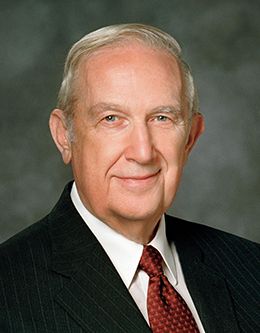
To Have Peace and Happiness
A time for optimism.

What Do You Expect?: A Key to Personal Happiness

Lessons of Pride and Glory from the Doctrine and Covenants

Why Giving Matters
To establish a secure foundation for life.

Choose to Celebrate

“In the World Ye Shall Have Tribulation: But Be of Good Cheer; I Have Overcome the World”

“My Soul Delighteth in the Things of the Lord”
“if thou art merry, praise the lord”.

Happily Ever After: Lessons from Joseph Smith, Lehi, and the Recent Accounting Scandals

“Lay Hold upon Every Good Thing”

“The Joy of the Lord Is Your Strength” (Nehemiah 8:10)
Four keys to a happy life.

Elements of Happiness
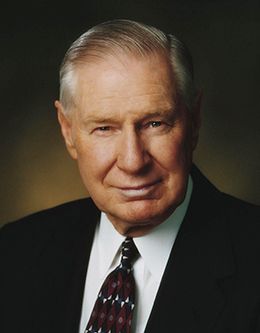
Our Search for Happiness
Finding happiness, godliness with contentment.

Living After the Manner of Happiness
The pursuit of happiness.

Selective Attitudes and the Happy Life
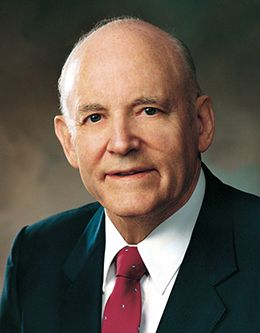
Fear Not, Little Flock
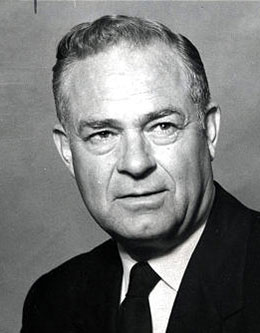
To the Lonely and Misunderstood

“The Royal Road to Happiness”

Seek Eternal Happiness

Let Not Your Heart Be Troubled
The odyssey to happiness.

The Success and Happiness Pattern

How to Be Happy
Gifts that money cannot buy.

Faith, the Key to Happiness

Join Pilot Waitlist

Home » Blog » General » Gratitude: The Key to Happiness – A Brief Speech on the Power of Thankfulness

Gratitude: The Key to Happiness – A Brief Speech on the Power of Thankfulness
Have you ever stopped to think about the power of gratitude in our lives? It’s a simple concept, yet it has the ability to transform our social and emotional well-being. Gratitude is the key to happiness, and in this brief speech, I will explore the definition, importance, and science behind gratitude. I will also provide practical tips for cultivating gratitude in our daily lives and discuss the power of thankfulness in speech.
The Definition and Importance of Gratitude
Gratitude can be defined as the quality of being thankful and showing appreciation for the good things in our lives. It is more than just saying “thank you” – it is a mindset and a way of life. Research has shown that gratitude has numerous benefits for our mental health. It can increase positive emotions, reduce stress and anxiety, and improve overall well-being. Additionally, gratitude plays a crucial role in building strong relationships. When we express gratitude towards others, it strengthens the bond between us and fosters a sense of connection and trust.
The Science Behind Gratitude
Gratitude has a profound impact on our brain and body. When we experience gratitude, our brain releases dopamine and serotonin, which are neurotransmitters associated with happiness and well-being. It also activates the prefrontal cortex, the part of the brain responsible for decision-making and emotional regulation. Over time, practicing gratitude can rewire our neural pathways, making us more inclined to notice and appreciate the positive aspects of life. Numerous studies have shown a strong correlation between gratitude and happiness, further highlighting the scientific basis of this powerful emotion.
Cultivating Gratitude in Daily Life
While gratitude may come naturally to some, it is a skill that can be cultivated and strengthened through practice. Here are some practical tips for incorporating gratitude into our daily lives:
- Keep a gratitude journal: Take a few minutes each day to write down three things you are grateful for. This simple practice can help shift your focus towards the positive aspects of your life.
- Express gratitude to others: Take the time to thank the people in your life who have made a positive impact. Whether it’s a handwritten note, a phone call, or a simple “thank you,” expressing gratitude can strengthen relationships and create a ripple effect of positivity.
- Find gratitude in challenging situations: Even in difficult times, there is always something to be grateful for. Look for the silver lining or the lessons learned in challenging situations. This mindset shift can help you navigate adversity with resilience and optimism.
Consistency is key when it comes to cultivating gratitude. Make it a habit to practice gratitude daily, and over time, you will begin to experience the long-term benefits of this powerful emotion.
The Power of Thankfulness in Speech
Gratitude is not limited to our thoughts and actions; it can also be expressed through speech. When we express gratitude to others, it not only makes them feel appreciated but also strengthens our relationships. Gratitude in speech can create a positive and supportive environment, fostering open communication and trust. It can also enhance our own communication skills by encouraging active listening and empathy.
Here are some tips for incorporating gratitude into our speech:
- Start conversations with gratitude: Begin conversations with a genuine expression of appreciation. This sets a positive tone and creates a foundation of goodwill.
- Use “thank you” frequently: Take the time to acknowledge and thank others for their contributions, no matter how small. This simple act of gratitude can go a long way in building strong relationships.
- Practice active listening: When someone is speaking, give them your full attention and show gratitude for their trust and vulnerability. Reflect back on what they have shared to demonstrate understanding and appreciation.
Gratitude is a powerful emotion that has the ability to transform our lives. By cultivating gratitude in our daily lives and incorporating it into our speech, we can experience increased happiness, improved relationships, and enhanced communication skills. I encourage you to embrace gratitude as a daily practice and make it a priority in your life. As Melody Beattie once said, “Gratitude makes sense of our past, brings peace for today, and creates a vision for tomorrow.” Start your journey towards a happier and more fulfilling life by practicing gratitude today.
Start your EverydaySpeech Free trial and discover the power of gratitude in building social and emotional well-being. Visit https://everydayspeech.com/start-free-trial/ to get started.
Related Blog Posts:
Pragmatic language: enhancing social skills for meaningful interactions.
Pragmatic Language: Enhancing Social Skills for Meaningful Interactions Pragmatic Language: Enhancing Social Skills for Meaningful Interactions Introduction: Social skills play a crucial role in our daily interactions. They enable us to navigate social situations,...
Preparing for Success: Enhancing Social Communication in Grade 12
Preparing for Success: Enhancing Social Communication in Grade 12 Key Takeaways Strong social communication skills are crucial for academic success and building meaningful relationships in Grade 12. Social communication includes verbal and non-verbal communication,...
Preparing for Success: Enhancing Social Communication in Grade 12 Preparing for Success: Enhancing Social Communication in Grade 12 As students enter Grade 12, they are on the cusp of adulthood and preparing for the next chapter of their lives. While academic success...

FREE MATERIALS
Better doesn’t have to be harder, social skills lessons students actually enjoy.
Be the best educator you can be with no extra prep time needed. Sign up to get access to free samples from the best Social Skills and Social-Emotional educational platform.
Get Started Instantly for Free
Complete guided therapy.
The subscription associated with this email has been cancelled and is no longer active. To reactivate your subscription, please log in.
If you would like to make changes to your account, please log in using the button below and navigate to the settings page. If you’ve forgotten your password, you can reset it using the button below.
Unfortunately it looks like we’re not able to create your subscription at this time. Please contact support to have the issue resolved. We apologize for the inconvenience. Error: Web signup - customer email already exists
Welcome back! The subscription associated with this email was previously cancelled, but don’t fret! We make it easy to reactivate your subscription and pick up right where you left off. Note that subscription reactivations aren't eligible for free trials, but your purchase is protected by a 30 day money back guarantee. Let us know anytime within 30 days if you aren’t satisfied and we'll send you a full refund, no questions asked. Please press ‘Continue’ to enter your payment details and reactivate your subscription
Notice About Our SEL Curriculum
Our SEL Curriculum is currently in a soft product launch stage and is only available by Site License. A Site License is currently defined as a school-building minimum or a minimum cost of $3,000 for the first year of use. Individual SEL Curriculum licenses are not currently available based on the current version of this product.
By clicking continue below, you understand that access to our SEL curriculum is currently limited to the terms above.

Speech on Positive Attitude
A positive attitude is like a bright light in a dark room. It can turn any situation into a stepping stone towards success.
You may think it’s just about being happy, but it’s more than that. It’s a mindset, a way of life that can truly transform your world.
1-minute Speech on Positive Attitude
Ladies and Gentlemen,
A positive attitude is like a magic key. It can open doors to happiness, success, and good health. The magic is not in some secret spell. The magic is in the way we think, act, and feel.
Think of your mind as a garden. If you plant seeds of kindness, love, and courage, you will harvest happiness. If you plant seeds of anger, fear, and doubt, you will harvest sadness. This is the power of positive thinking.
Remember, we cannot control everything that happens to us. But we can control how we respond. We can choose to react with anger, or we can choose to react with understanding. We can choose to be upset, or we can choose to be happy. The choice is ours.
In closing, let me say this. A positive attitude is not something you are born with. It is something you develop over time. It is a habit, a way of life. So, let’s start today. Let’s plant seeds of positivity in our minds. Let’s choose to be happy. Let’s choose to have a positive attitude.
2-minute Speech on Positive Attitude
Today, I’m here to talk to you about something really important. It’s a key that can unlock doors to success and happiness. That key is a ‘Positive Attitude’.
Having a positive attitude is like having a magic wand. It can help you overcome challenges. Picture this – you have a big test coming up. You can choose to be scared and worried. Or, you can choose to be positive, believe in your abilities, study hard, and give it your best shot. Which do you think will make you feel better and do better? The answer is clear. The magic wand of a positive attitude!
But don’t just take my word for it. Science backs this up too. Studies show that people with a positive attitude are healthier and happier. They’re better at solving problems and they make friends more easily. They smile more and they bring joy to others. All because they choose to see the bright side of life.
In conclusion, a positive attitude is a powerful tool. It can change your life. It can make you happier, healthier, and more successful. It’s a choice you make every day. So, why not choose to be positive? Why not choose to see the good in life? Why not choose to believe in yourself and your dreams?
Leave a Reply Cancel reply
Save my name, email, and website in this browser for the next time I comment.


Finding Joy: How Positive Anticipation Boosts Your Happiness
Thinking about the future is an under-used tool for building emotional health..
Updated June 23, 2024 | Reviewed by Abigail Fagan
- Research shows that positively anticipating the future is a highly effective way to create positive emotions.
- Mentally simulating future scenarios activates the brain's reward system and releases dopamine.
- Strategies such as planning, visualization, aspiration boards and more can help with positive future thinking.

In the world of mental health and self-development, the phrase "live in the moment" is frequently promoted as the key to happiness . While being present undoubtedly has its merits, scientific research shows that positively anticipating the future is a highly effective way to generate positive emotions and boost well-being. However, it is rarely used as the go-to method when people are trying to improve how they feel.
One significant reason future thinking enhances emotional well-being is that a large part of the brain is devoted to anticipating rewards. Studies have shown that anticipating future events can be more pleasurable than the events themselves. Thinking about the future involves mentally simulating future scenarios, which activates the brain's reward system and releases dopamine , a neurotransmitter linked to pleasure and happiness.
For instance, imagine planning a beach holiday. The thought of relaxing by the ocean, feeling the sand between your toes, and enjoying the sunshine can bring a smile to your face months before you actually go. The anticipation of the trip provides a prolonged period of excitement and enthusiasm.
The key to using future thinking in a way that makes you feel good is to stay focused on what you are wanting or the desired outcome. If you are enjoying imagining yourself on a beautiful beach getaway, and then start thinking about not being able to afford it, now you are thinking about a future you don’t think you can have and that will instead create a negative emotion .
Here are some practical ways you can spend more time focused on your future in a way that can create more happiness in your life.
- Plan Regular Enjoyable Activities : The future doesn’t have to be far away or a grand ambition. You can anticipate having a nice meal in a restaurant with a friend or going for a walk in a beautiful scenic place. Scheduling regular activities that you enjoy and look forward to is an important life skill for keeping a positive mindset. Whether it's a weekly coffee date with a favorite friend, a monthly hike, or an annual family trip, having something on the calendar gives you something positive to anticipate.
- Create an Aspiration Board : To create a bigger picture of positive life events to anticipate, gather images and words that represent your dreams and goals. Arrange them on a board where you can see them daily. This visual reminder keeps you focused on what you’re looking forward to and can boost your daily motivation and happiness. Don’t worry about how you will accomplish those things, your brain will start to work on ideas and help you create plans, as long as you believe the goals are possible.
- Set Small, Specific, Achievable Goals : Break down your long-term goals into smaller, manageable tasks. For instance, if you aim to write a book, start with a goal to write 500 words a day. These small wins build momentum and keep you excited about your progress.
- Visualize Positive Outcomes : Spend a few minutes each day visualizing yourself achieving your goals. Picture the details, feel the emotions, and immerse yourself in the experience. Couple this with seeing yourself taking some steps toward achieving the goal. This practice of simulating both the outcome and the process of getting there is key and it not only boosts happiness but also increases the likelihood of accomplishing what you’re working toward.
- Keep a Gratitude Journal With a Future Twist : While gratitude journals typically focus on the present, try adding a future twist. Write about what you’re grateful for now and what you look forward to. For example, "I’m grateful for my health today and excited about the upcoming yoga retreat." Don't forget to feel the emotion. Remember, gratitude isn't an intellectual exercise it is an actual emotion.
Thinking about the future is an important wellness tool you can use to enhance your emotional health by providing a sense of direction, purpose, and excitement. By setting goals, planning enjoyable activities, and visualizing positive outcomes, you can harness the mind’s power of anticipation to increase happiness and improve the overall quality of your life.
Baumeister, R. F., Vohs, K. D., Aaker, J. L., & Garbinsky, E. N. (2013). Some key differences between a happy life and a meaningful life. The Journal of Positive Psychology , 8(6), 505-516.
Dweck, C. S. (2016). Mindset: The New Psychology of Success . Ballantine Books.
Emmons, R. A., & McCullough, M. E. (2003). Counting blessings versus burdens: An experimental investigation of gratitude and subjective well-being in daily life. Journal of Personality and Social Psychology , 84(2), 377-389.
Fredrickson, B. L. (2013). Positive emotions broaden and build. Advances in Experimental Social Psychology , 47, 1-53.
Gollwitzer, P. M., & Sheeran, P. (2006). Implementation intentions and goal achievement: A meta-analysis of effects and processes. Advances in Experimental Social Psychology , 38, 69-119.
Locke, E. A., & Latham, G. P. (2013). New developments in goal setting and task performance. Routledge .
Lyubomirsky, S. (2008). The How of Happiness: A Scientific Approach to Getting the Life You Want . Penguin Press.
MacLeod, A. K., & Conway, C. (2007). Well-being and the anticipation of future positive experiences: The role of prospection in happiness. Journal of Research in Personality , 41(2), 167-174.
Oettingen, G. (2012). Future thought and behaviour change. European Review of Social Psychology , 23(1), 1-63.
Seligman, M. E. P., Railton, P., Baumeister, R. F., & Sripada, C. (2013). Navigating into the future or driven by the past. Perspectives on Psychological Science , 8(2), 119-141.
Taylor, S. E., Pham, L. B., Rivkin, I. D., & Armor, D. A. (1998). Harnessing the imagination: Mental simulation, self-regulation, and coping. American Psychologist , 53(4), 429-439.
Wilson, T. D., & Gilbert, D. T. (2005). Affective forecasting: Knowing what to want. Current Directions in Psychological Science , 14(3), 131-134.

Jennice Vilhauer, Ph.D. , is the Director of Emory University’s Adult Outpatient Psychotherapy Program in the Department of Psychiatry and Behavioral Science in the School of Medicine.
- Find a Therapist
- Find a Treatment Center
- Find a Psychiatrist
- Find a Support Group
- Find Online Therapy
- International
- New Zealand
- South Africa
- Switzerland
- Asperger's
- Bipolar Disorder
- Chronic Pain
- Eating Disorders
- Passive Aggression
- Personality
- Goal Setting
- Positive Psychology
- Stopping Smoking
- Low Sexual Desire
- Relationships
- Child Development
- Self Tests NEW
- Therapy Center
- Diagnosis Dictionary
- Types of Therapy

At any moment, someone’s aggravating behavior or our own bad luck can set us off on an emotional spiral that could derail our entire day. Here’s how we can face triggers with less reactivity and get on with our lives.
- Emotional Intelligence
- Gaslighting
- Affective Forecasting
- Neuroscience

IMAGES
VIDEO
COMMENTS
A grateful person finds happiness even in small things in life. We should look at people below us and be thankful. Also, we should be grateful for the eyes. We can see the beautiful world around us. Moreover, we must be satisfied in life. Hence, to be happy, we should lessen the burden of desires and expectations.
Short Speech on Happiness. Happiness is one of the most important things to live a healthy life. Many people don't want to spend the time or don't feel the need to consider what happiness is, but they are aware of how they feel happy. But understanding what happiness means in today's society is the most crucial and significant thing.
February 8, 2024 by Prasanna. Happiness Speech: Happiness is a feeling which everyone loves. You can be happy in trying times of your life by accepting your situation as it is and not trying to control what cannot be controlled. Happiness comes through letting go. Happiness is a type of emotion like all other emotions.
The happy secret to better work. Shawn Achor. 18:02. Apr 2019. Plug into your hard-wired happiness. Srikumar Rao. Dan Gilbert, author of "Stumbling on Happiness," challenges the idea that we'll be miserable if we don't get what we want. Our "psychological immune system" lets us feel truly happy even when things don't go as planned.
The work they are doing, relationships, achievements, and some other things in life should bring the satisfaction that provides happiness. In happiness speech in English let us see the types of happiness: Hedonia: It is also known as short-term happiness. Generally, it is referred to as pleasure. Leading the dream life, self-care, fulfilling ...
The one thing all humans have in common is that each of us wants to be happy, says Brother David Steindl-Rast, a monk and interfaith scholar. And happiness, he suggests, is born from gratitude. An inspiring lesson in slowing down, looking where you're going, and above all, being grateful. 03:15. Laura Trice.
It makes a person more productive. When a person is happy they can view things with positivity and with a broader perspective. Happiness goes a long way. It can affect a person's health as well. People who are constantly happy are seen to live longer. Happiness is also very influential. A happy person can do more and learn more from other people.
Happiness is a fundamental human experience that is within reach for every one of us. Staying happy is very important because when we are happy, we radiate positivity, inspire others, and make the world a brighter place for everyone. Thank you. Quick Read: Farewell Speech for Colleague. 10 Lines Speech on Happiness
1-minute Speech on Happiness. Ladies and Gentlemen, Today, I am here to talk about an emotion that is universal, an emotion that is profoundly human; "Happiness". It is a word that brings a smile to our faces, fills our hearts with warmth, and inspires us to be better individuals. Happiness is not a destination, it is a journey.
August 2, 2021 by Sandeep. Speech on Happiness: Happiness is the most divine feeling of bliss and solitude in one's heart. Every man needs to create his own happy nest irrespective of the circumstances he faces. Happiness is an underlying emotion that creates a positive frame of living. A man achieves happiness when he successfully reaches ...
What keeps us happy and healthy as we go through life? If you think it's fame and money, you're not alone - but, according to psychiatrist Robert Waldinger, ...
If you want happiness for a day, go fishing. If you want happiness for a year, inherit a fortune. If you want happiness for a lifetime, help someone else.". - Chinese Proverb. "Happiness is only real when shared.". - Jon Krakauer. "Happiness lies in the joy of achievement and the thrill of creative effort.". - Franklin D. Roosevelt.
The Pursuit of Happiness. W. Mack Lawrence. June 13, 1995. In simple terms, a righteous life is the way—the only way—to happiness, joy, and peace. Greetings to all! What a great blessing to me personally to be here, to share a few thoughts with you, and to express my testimony of the Lord Jesus Christ. I have so many blessings—all too ...
The habits of happiness. 10,667,091 views | Matthieu Ricard | TED2004 • February 2004. Read transcript. What is happiness, and how can we all get some? Biochemist turned Buddhist monk Matthieu Ricard says we can train our minds in habits of well-being, to generate a true sense of serenity and fulfillment. culture; global issues;
The three dimensions of happiness. Happiness can be defined as an enduring state of mind consisting not only of feelings of joy, contentment, and other positive emotions, but also of a sense that one's life is meaningful and valued (Lyubomirsky, 2001). Happiness energizes us and is a highly sought after state of being.
Good morning to one and all present here. Today, I'll be giving a short speech on the topic 'Happiness'. To be happy is an integral part of everyone's life. Each and everyone should take a conscious effort to remain happy instead of being miserable and stressed every day! They say, "All work and no play makes Jack a dull boy.".
It's also known as the Happiness Course. Since then, Laurie has taken the happiness course online at Coursera, where thousands of people enrolled in the program. But then when the pandemic and the lockdowns came, a time when so many people were reassessing what was truly important in their lives, that number shot up into the millions.
In striving for happiness, the most important factor is for a person to have 'complete virtue' - in other words, to have good moral character (Pursuit of Happiness, 2018). Eudaimonia was, according to Aristotle, "activity expressing virtue" that will therefore lead to a happy life. Aristotle proposed that happiness was neither virtue ...
Happiness includes the ability to acknowledge and embrace every emotion, even the unpleasant ones. It involves seeing the big picture, rather than getting stuck in the details. Overall, being ...
Two key components of happiness (or subjective well-being) are: The balance of emotions: Everyone experiences both positive and negative emotions, feelings, and moods. Happiness is generally linked to experiencing more positive feelings than negative ones. Life satisfaction: This relates to how satisfied you feel with different areas of your ...
When we make the right choices, we experience happiness. When we sin, we experience sadness and sorrow (2 Nephi 2:27). Thankfully, Jesus Christ provided us a way to overcome the sorrow that comes both with our sins and with the experience of being mortal. Jesus Christ atoned for us, meaning he suffered the punishment for all of our sins.
The Definition and Importance of Gratitude. Gratitude can be defined as the quality of being thankful and showing appreciation for the good things in our lives. It is more than just saying "thank you" - it is a mindset and a way of life. Research has shown that gratitude has numerous benefits for our mental health.
A smile is like a bright sunbeam. It can light up a room. It can make someone's day better. This is what a positive attitude does. A positive attitude is like a magic key. It can open doors to happiness, success, and good health. The magic is not in some secret spell. The magic is in the way we think, act, and feel. Think of your mind as a ...
Well-being and the anticipation of future positive experiences: The role of prospection in happiness. Journal of Research in Personality , 41(2), 167-174. Oettingen, G. (2012).